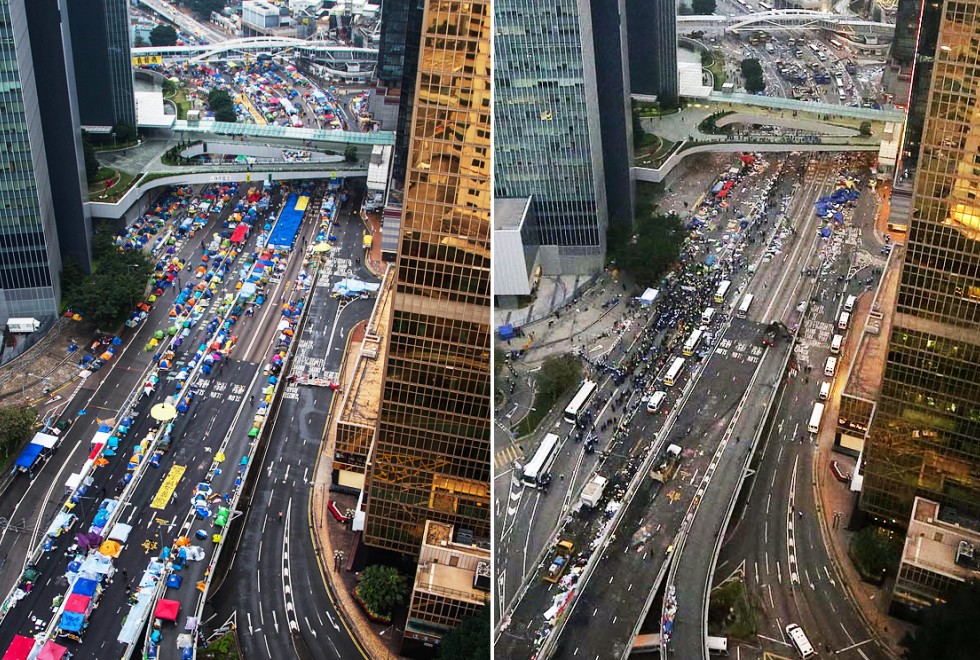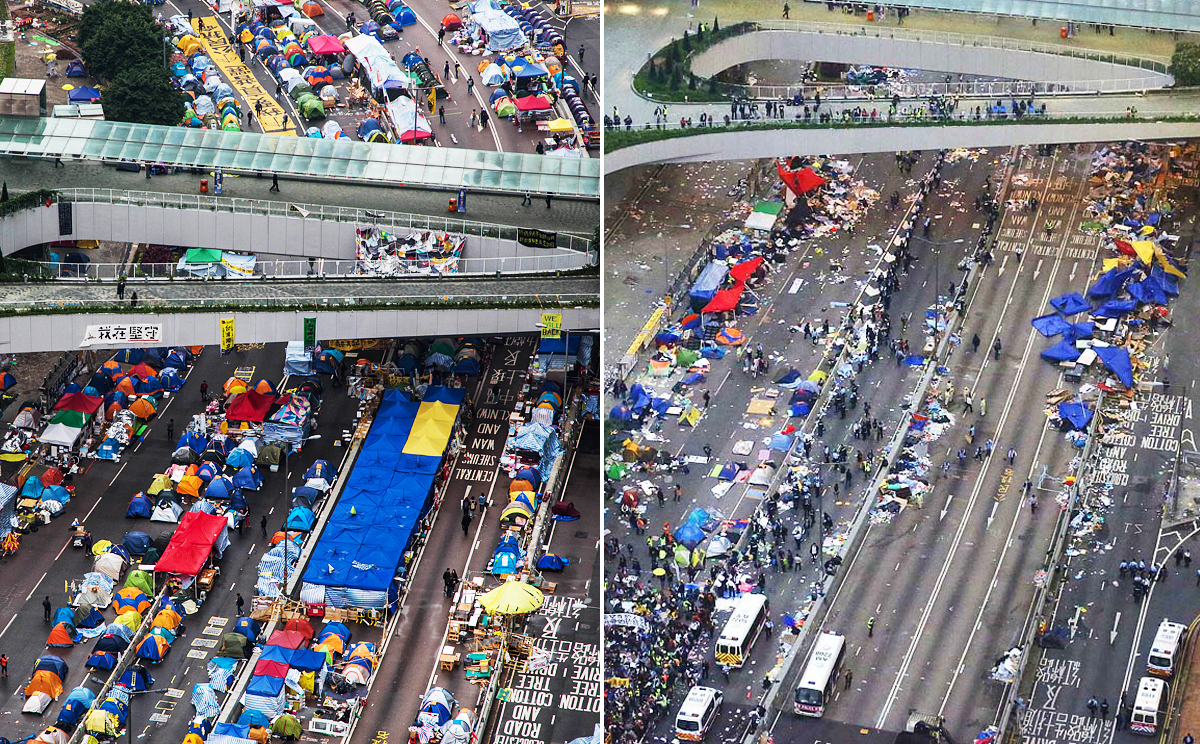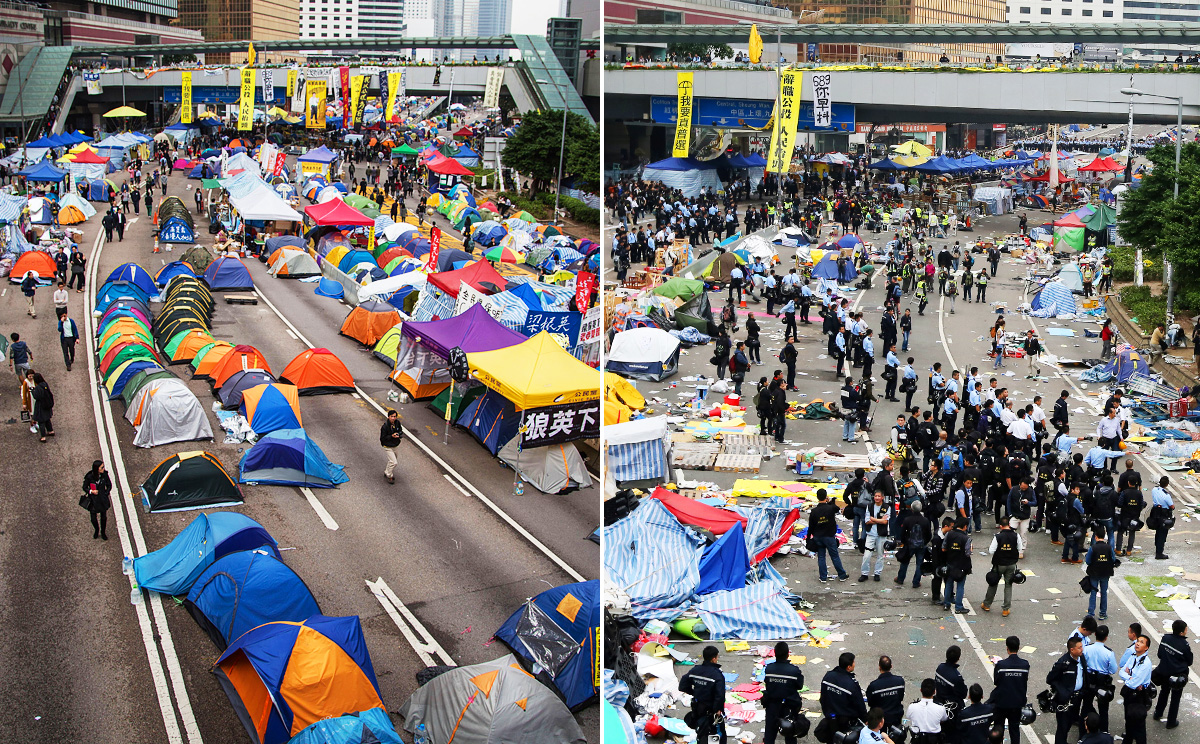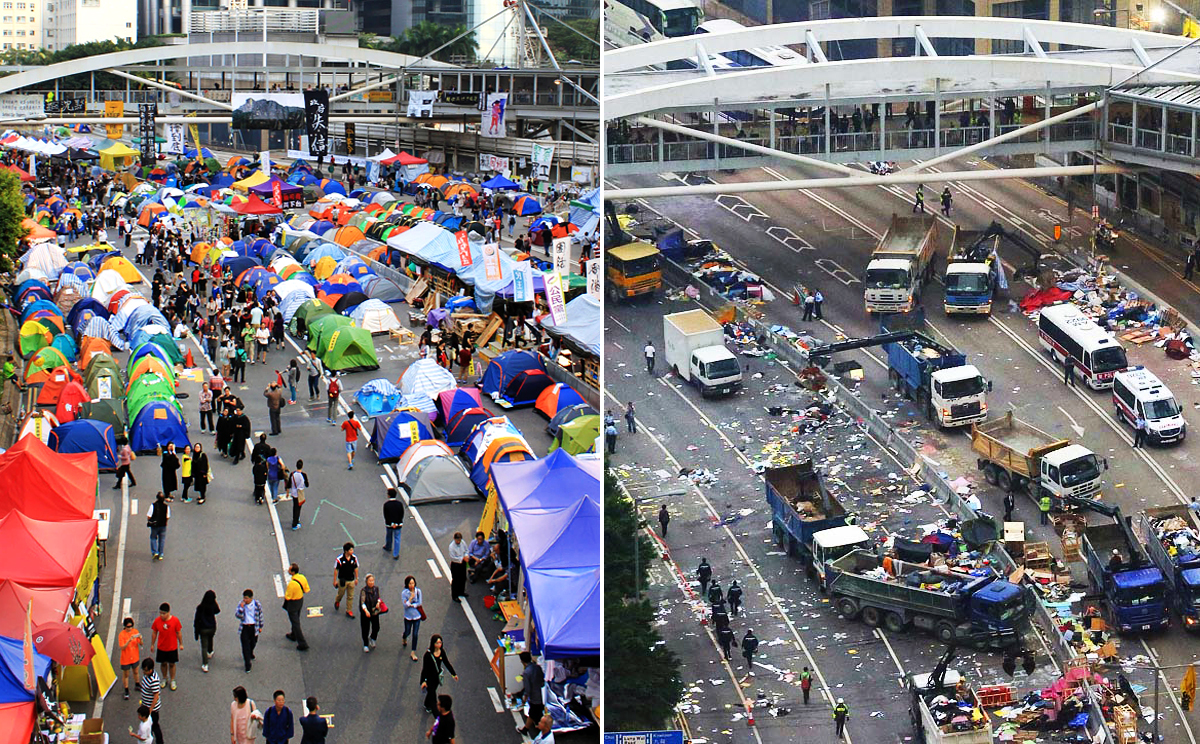-
IP addresses are NOT logged in this forum so there's no point asking. Please note that this forum is full of homophobes, racists, lunatics, schizophrenics & absolute nut jobs with a smattering of geniuses, Chinese chauvinists, Moderate Muslims and last but not least a couple of "know-it-alls" constantly sprouting their dubious wisdom. If you believe that content generated by unsavory characters might cause you offense PLEASE LEAVE NOW! Sammyboy Admin and Staff are not responsible for your hurt feelings should you choose to read any of the content here. The OTHER forum is HERE so please stop asking.
You are using an out of date browser. It may not display this or other websites correctly.
You should upgrade or use an alternative browser.
You should upgrade or use an alternative browser.
#OccupyCentral thread: Give me Liberty or Give me Death!
- Thread starter Asterix
- Start date
- Joined
- Nov 19, 2012
- Messages
- 212
- Points
- 0
The game changes: as Occupy sites are cleared, Hong Kong's democracy protesters go 'shopping'
As the clearance of Occupy sites at Admiralty begins, new forms of spontaneous and leaderless protest are starting to emerge
PUBLISHED : Thursday, 11 December, 2014, 2:56am
UPDATED : Thursday, 11 December, 2014, 9:37pm
Samuel Chan [email protected]
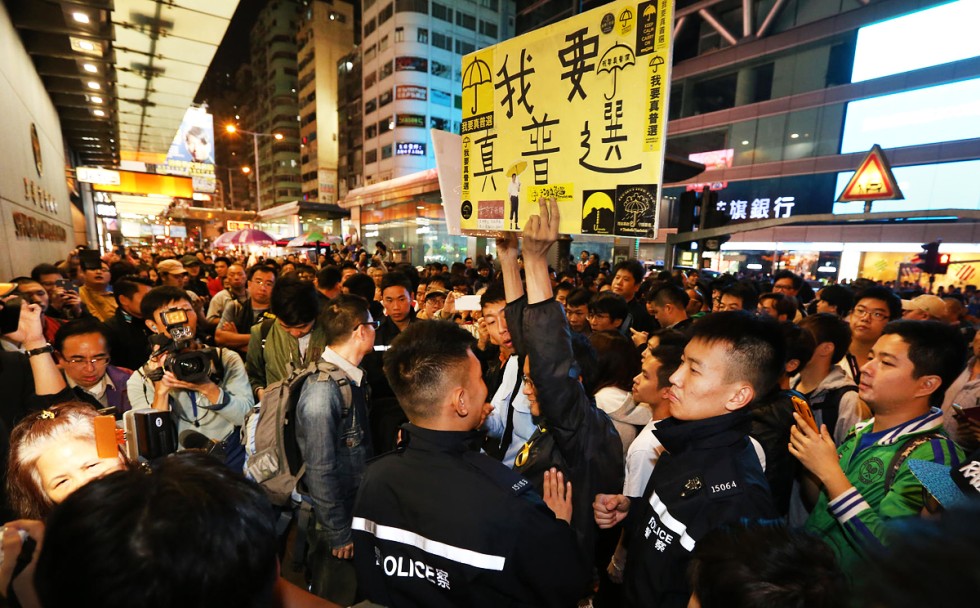
Pro-democracy activists "shopping" in Mong Kok. Photo: Nora Tam
The "shopping tour" protest in Mong Kok on Tuesday night appeared at first as if it had lost steam. Only a tiny crowd showed up at the usual starting point, outside the Broadway Cinema on Sai Yeung Choi Street South.
Most of the younger "shoppers", whose numbers could grow to 200 each night, were nowhere in sight. Instead, a counter-protest group lurked nearby.
But then the "shoppers" popped up suddenly, right behind the counter-protesters and hurled sarcasm-laced chants at them.
Each night, the protesters turn on its head a call by Chief Executive Leung Chun-ying for the public to shop more in Mong Kok, after the two-month-long street occupation was cleared on November 26. They show up to do just that - except that they only buy a few, inexpensive items and mostly walk up and down the pavements, singing and shouting slogans.
Sarcasm infuses the "shopping tour" as protesters shout "gau wu", a Cantonese transliteration of Putonghua's gou wu or "to shop". The expression became popular after a mainland tourist who joined an early anti-Occupy rally told a reporter she was there to shop.
This new form of demonstrating may just be the beginning of more to come as pro-democracy activists experiment with new ways to continue their fight after Occupy. The key features of the "shopping tour" protest - spontaneous, leaderless, sporadic and possibly skating on thin legal ice - give a hint of the emerging forms of social activism in post-Occupy Hong Kong.
The shops appear wary. Most put up their shutters when the protesters appear, their business disrupted. But among those that responded to the Post's queries, jewellery chain Chow Tai Fook said it saw no impact on its daily operations or revenue, while Tse Suen Luen Jewellery reported a "drop in foot traffic" at its two stores in the area.
The core group of "shoppers" - most of whom spent their days in October and November camping in Mong Kok - stressed they came of their own accord and not at anyone's bidding.
"If you ask me who the organiser is, I can think of nobody but 689," said protester Man Ip, using a popular nickname for CY Leung that refers to the 689 votes he received from the 1,200-member election committee in 2012.
"Not a single group now has that much influence and power that they can order others around," said the 23-year-old fresh graduate who has been at Mong Kok every night since September 28, when police used tear gas on protesters.
"It started out as an attempt to try to reoccupy Nathan Road on the night after it was cleared, but we were very much outnumbered by the cops," Man said.
"Soon, there were people chanting ' gau wu, gau wu', telling others to follow 689's appeal to shop and that's how it started."
But Man conceded that protesters had not yet thought of ways to go further with the "shopping tour".
Most die-hard Occupy protesters, he said, were exhausted by the toll their two-month strike had taken.
Another "shopping tour" protester, Sam Ho, 36, was equally candid. He said they might not be able to "come up with brilliant ideas" on how to move forward, but "as long as police are beating people up for no reason, we will be wherever we are needed." He himself belonged to a small group of musicians and other artists who got involved in several aspects of the protest and did not rule out regrouping later.
Whichever action they choose, the protesters will have to think carefully about their legal implications.
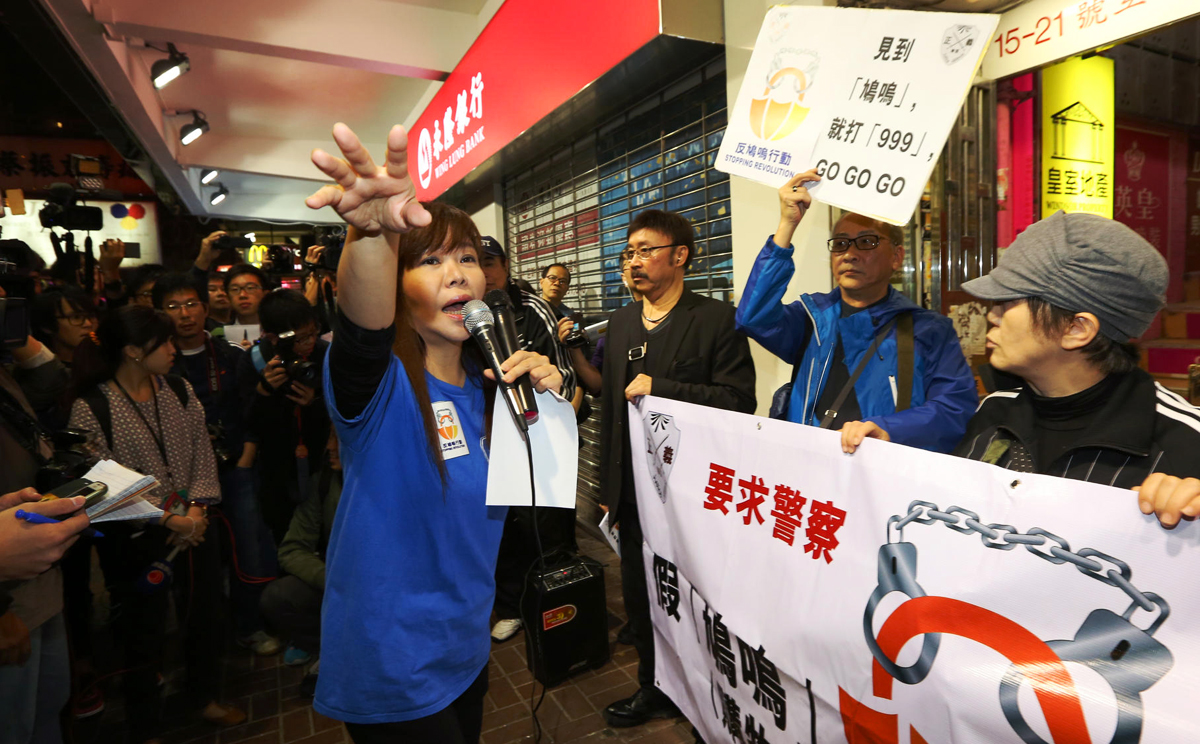
Leticia Lee See-yin (left) from the Justice Alliance protests against the "shopping tour". Photo: Nora Tam
Barrister Albert Luk Wai-hung said there was every chance that even if what the "shoppers" did appeared above board, the courts might not be persuaded if the police pressed charges. Possible offences, among other things, could include unlawful assembly or loitering.
As pro-democracy activists mull over their post-Occupy strategies, a scholar who studies public opinion told the Post that the movement would likely intensify if the government offered no compromise that at least the majority would accept.
"Hong Kong over the past 10-odd years has been undergoing a slow process of radicalisation," said Professor Francis Lee Lap-fung, a journalism scholar at Chinese University who conducts regular public opinion polls - including a recent survey which charted the public support for the Occupy protests.
"You can find a moderate and a radical faction in every social movement," Lee said.
In the "umbrella movement", he believed the moderates would continue to take charge if those in power were willing to engage in negotiations and if the outcome satisfied the majority. That would then leave less room for the radicals to gain ground.
But if the deadlock continues, Lee said the ensuing protests would likely get increasingly more radical as frustration grew.
"The Occupy Central co-founders [Benny Tai Yiu-ting, Dr Chan Kin-man and the Reverend Chu Yiu-ming] have already said Hong Kong has entered the era of civil disobedience," Lee added. "Different forms of non-cooperation will certainly appear, but the formats they will take are hard to guess at the moment."
He expects though that many smaller protests or actions at different locations may be the thrust of a looser, wider movement.
Ip Iam-chong, assistant cultural studies professor at Lingnan University, said the groups could work separately as long as they shared the same goals and "a movement with a wider spectrum will be harder for those in power to handle".
On their "leaderless" structure, he said: "If you are committed to a cause instead of just taking part in flash mob actions, you have to figure out how to organise the like-minded into something bigger."
- Joined
- Nov 19, 2012
- Messages
- 212
- Points
- 0
Re: UN supports HK protestors!!!
Hongkongers take a last look round the main protest site in Admiralty
PUBLISHED : Thursday, 11 December, 2014, 2:56am
UPDATED : Thursday, 11 December, 2014, 7:57am
Jennifer Ngo [email protected]
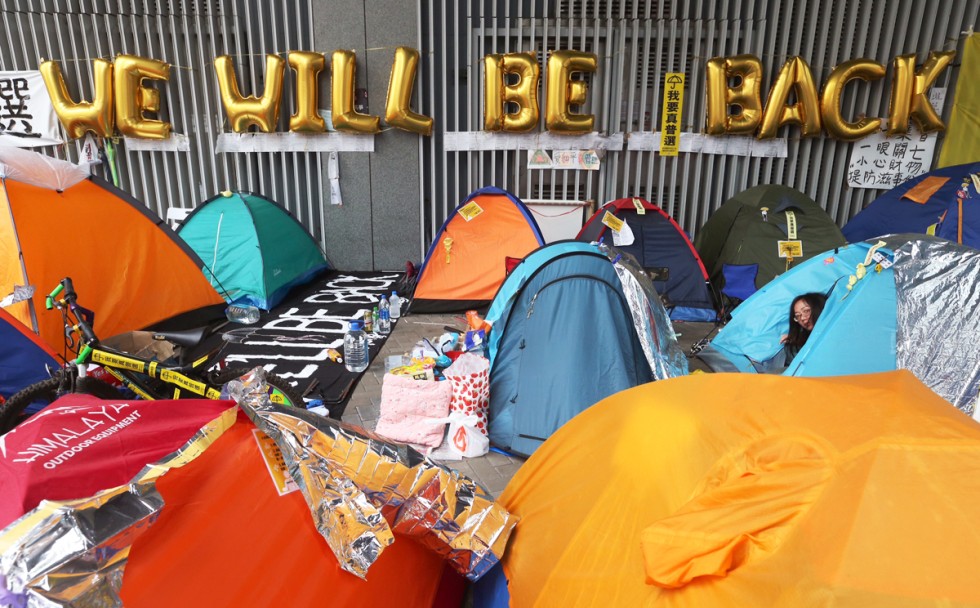
The protesters are expecting to be out of Admiralty after the police move in today. But they have made their future intentions crystal clear. Photo: K.Y. Cheng
Every few steps, someone stopped to take a photograph.
Across the "umbrella movement's" Admiralty site yesterday, people milled around the tents and artwork on car-free highways for probably the last time.
As evening approached, the crowds swelled to thousands.
It had been 74 days since Occupy Central was launched and a sense of nostalgia was evident among those who visited on the eve of the police clearance. People paused to take pictures of everything - from the smallest "I want genuine universal suffrage" sticker on a pole to the gigantic yellow umbrella sitting on Tim Mei Avenue.
There were last-minute calls for signatures and speeches in support of Occupy - with a renewed fervour that had marked the beginning of the mass sit-ins on September 28.
Many had come because they heard the site was to be cleared. All wanted to remember this historically significant event.
"I want to record these things. I want to photograph everything here," said office clerk Wing Ng, 39, who had slipped from her office in the afternoon. "Seeing all these heartfelt messages, I'm very touched. It's emotional for me.
"Hongkongers have always been forgetful and selfish. But this is proof that we can change. I'm proud to be a Hongkonger."
With tears in her eyes, she added: "There is strength in unity. That is my favourite slogan seen here. I hope we will remember that."
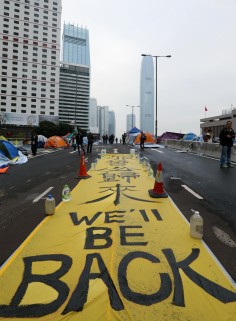
Protesters leave a message on the ground at Admiralty. Photo: K.Y. Cheng
As the visitors wandered around, protesters cleared their tents and volunteers packed piles of supplies into bags and boxes.
The artwork, however, will remain - the banners flapping from Tamar Bridge and thousands of post-it notes, by now inches thick on the "Lennon Wall" along Harcourt Road.
Protesters would still have access to supplies. Lau Yiu-man, 59, who was in charge of the supply station outside the Legislative Council Building, said the bulk of his items - mostly umbrellas, gloves and masks - would be moved to the area outside the British consulate on Supreme Court Road.
"I want to fight," he declared. "It was heartbreaking watching the beaten and bruised students in the past week, so I will fight."
Meanwhile, mixed-media artist George Wong, 31, sat outside his beautifully decorated tent depicting the four brick walls of a home in the four seasons.
Wong saw Occupy as a beginning and not an end of what would be a long-running movement for democracy.
"My tent, depicted as a house, signifies permanence - that the resolve to fight for democracy is a long-term unwavering movement, through all seasons," he said.
He said he would donate his tent to the Occupy Archive, a public initiative to preserve and record the wealth of creativity found in Admiralty.
Other protesters were also resolute, with many deciding to stay until the end and to continue to campaign for democracy.
"I'll be fixing things till the very end," said 69-year-old Uncle Chan, while hammering planks to make a new set of stairs to fit over concrete dividers.
Like many of the protesters, Chan had made new friends and cultivated a sense of community that he said he would miss.
Housewife and mother Ho Shiu-bik said she understood why the protesters were standing their ground until the end.
"They are doing this for all of us. They want to fight for a future of freedom and equality for Hong Kong."
Hongkongers take a last look round the main protest site in Admiralty
PUBLISHED : Thursday, 11 December, 2014, 2:56am
UPDATED : Thursday, 11 December, 2014, 7:57am
Jennifer Ngo [email protected]

The protesters are expecting to be out of Admiralty after the police move in today. But they have made their future intentions crystal clear. Photo: K.Y. Cheng
Every few steps, someone stopped to take a photograph.
Across the "umbrella movement's" Admiralty site yesterday, people milled around the tents and artwork on car-free highways for probably the last time.
As evening approached, the crowds swelled to thousands.
It had been 74 days since Occupy Central was launched and a sense of nostalgia was evident among those who visited on the eve of the police clearance. People paused to take pictures of everything - from the smallest "I want genuine universal suffrage" sticker on a pole to the gigantic yellow umbrella sitting on Tim Mei Avenue.
There were last-minute calls for signatures and speeches in support of Occupy - with a renewed fervour that had marked the beginning of the mass sit-ins on September 28.
Many had come because they heard the site was to be cleared. All wanted to remember this historically significant event.
"I want to record these things. I want to photograph everything here," said office clerk Wing Ng, 39, who had slipped from her office in the afternoon. "Seeing all these heartfelt messages, I'm very touched. It's emotional for me.
"Hongkongers have always been forgetful and selfish. But this is proof that we can change. I'm proud to be a Hongkonger."
With tears in her eyes, she added: "There is strength in unity. That is my favourite slogan seen here. I hope we will remember that."

Protesters leave a message on the ground at Admiralty. Photo: K.Y. Cheng
As the visitors wandered around, protesters cleared their tents and volunteers packed piles of supplies into bags and boxes.
The artwork, however, will remain - the banners flapping from Tamar Bridge and thousands of post-it notes, by now inches thick on the "Lennon Wall" along Harcourt Road.
Protesters would still have access to supplies. Lau Yiu-man, 59, who was in charge of the supply station outside the Legislative Council Building, said the bulk of his items - mostly umbrellas, gloves and masks - would be moved to the area outside the British consulate on Supreme Court Road.
"I want to fight," he declared. "It was heartbreaking watching the beaten and bruised students in the past week, so I will fight."
Meanwhile, mixed-media artist George Wong, 31, sat outside his beautifully decorated tent depicting the four brick walls of a home in the four seasons.
Wong saw Occupy as a beginning and not an end of what would be a long-running movement for democracy.
"My tent, depicted as a house, signifies permanence - that the resolve to fight for democracy is a long-term unwavering movement, through all seasons," he said.
He said he would donate his tent to the Occupy Archive, a public initiative to preserve and record the wealth of creativity found in Admiralty.
Other protesters were also resolute, with many deciding to stay until the end and to continue to campaign for democracy.
"I'll be fixing things till the very end," said 69-year-old Uncle Chan, while hammering planks to make a new set of stairs to fit over concrete dividers.
Like many of the protesters, Chan had made new friends and cultivated a sense of community that he said he would miss.
Housewife and mother Ho Shiu-bik said she understood why the protesters were standing their ground until the end.
"They are doing this for all of us. They want to fight for a future of freedom and equality for Hong Kong."
- Joined
- Nov 19, 2012
- Messages
- 212
- Points
- 0
Re: UN supports HK protestors!!!
Hong Kong volunteers photograph and reclaim artworks ahead of police clearance of Admiralty protest site
PUBLISHED : Thursday, 11 December, 2014, 2:56am
UPDATED : Thursday, 11 December, 2014, 2:56am
Vivienne Chow [email protected]
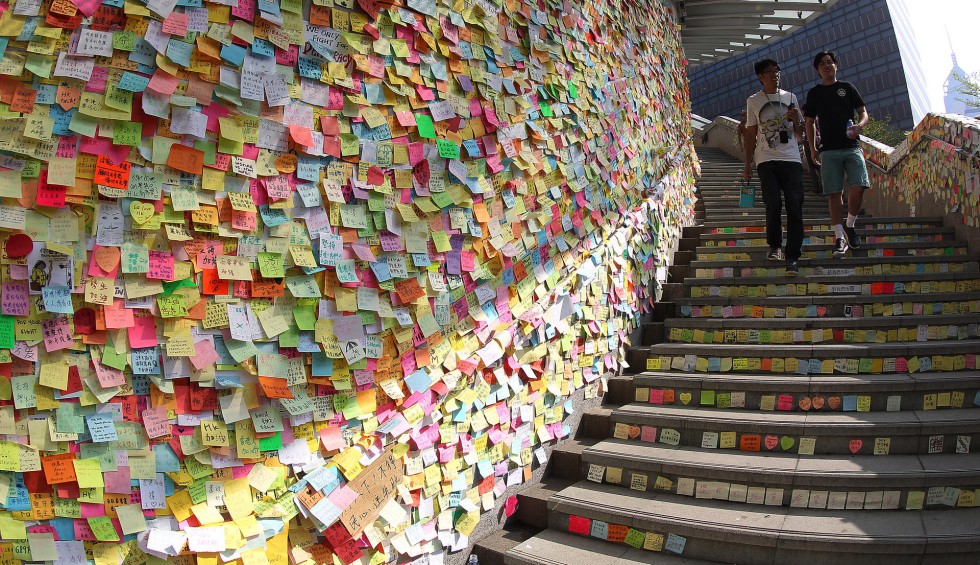
The post-its. Photo: Dickson Lee
The headline-grabbing street art carrying some Hongkongers' hopes for democracy along Harcourt Road will be history once the police show up to clear Occupy protests in Admiralty today, but artists and creators vow to ensure the works continue to live on in new forms - virtually and physically.
Creators of the Lennon Wall - a site named after the late Beatle John Lennon - and artists archiving the protest-inspired artworks raced against time overnight to collect as many pieces as possible before the site is cleared.
Last night, Lennon Wall volunteers collected as many post-its as they could. They also took photos of each item - 13GB in all - for uploading on a website.
Allen Tang Wai-lun, one of the 10 core volunteers working on the Lennon Wall, said the iconic site made by tens of thousands of post-its stuck on a wall of the government headquarters will live on in cyberspace.
"We will rebuild the wall in the virtual space, allowing people to post messages," Tang said.
On another front, volunteers from the Umbrella Movement Visual Archives and Research Collective spent two nights collecting important creative objects that documented the movement.
Artist Sampson Wong Yu-hin, one of the core members of the archive, said more than 30 volunteers had worked overnight, collecting items such as banners, tents and makeshift staircases. He said there were plans to publish a book and create a website for future research purposes.
Artist and Polytechnic University design assistant professor Kacey Wong Kwok-choi, who is working on a digital archive of the artworks with other volunteers, said even though the movement did not achieve its goal of genuine universal suffrage, it showcased Hong Kong people's creativity when they are liberated by the freed up space at Occupy sites.
"There is no going back. The spirit of the movement will stay in people's hearts, just like the banner hung on Lion Rock," he said.
Hong Kong volunteers photograph and reclaim artworks ahead of police clearance of Admiralty protest site
PUBLISHED : Thursday, 11 December, 2014, 2:56am
UPDATED : Thursday, 11 December, 2014, 2:56am
Vivienne Chow [email protected]

The post-its. Photo: Dickson Lee
The headline-grabbing street art carrying some Hongkongers' hopes for democracy along Harcourt Road will be history once the police show up to clear Occupy protests in Admiralty today, but artists and creators vow to ensure the works continue to live on in new forms - virtually and physically.
Creators of the Lennon Wall - a site named after the late Beatle John Lennon - and artists archiving the protest-inspired artworks raced against time overnight to collect as many pieces as possible before the site is cleared.
Last night, Lennon Wall volunteers collected as many post-its as they could. They also took photos of each item - 13GB in all - for uploading on a website.
Allen Tang Wai-lun, one of the 10 core volunteers working on the Lennon Wall, said the iconic site made by tens of thousands of post-its stuck on a wall of the government headquarters will live on in cyberspace.
"We will rebuild the wall in the virtual space, allowing people to post messages," Tang said.
On another front, volunteers from the Umbrella Movement Visual Archives and Research Collective spent two nights collecting important creative objects that documented the movement.
Artist Sampson Wong Yu-hin, one of the core members of the archive, said more than 30 volunteers had worked overnight, collecting items such as banners, tents and makeshift staircases. He said there were plans to publish a book and create a website for future research purposes.
Artist and Polytechnic University design assistant professor Kacey Wong Kwok-choi, who is working on a digital archive of the artworks with other volunteers, said even though the movement did not achieve its goal of genuine universal suffrage, it showcased Hong Kong people's creativity when they are liberated by the freed up space at Occupy sites.
"There is no going back. The spirit of the movement will stay in people's hearts, just like the banner hung on Lion Rock," he said.
- Joined
- Sep 25, 2013
- Messages
- 127
- Points
- 0
The people behind Occupy
Why they joined Occupy, and what it means to them
PUBLISHED : Thursday, 11 December, 2014, 2:56am
UPDATED : Thursday, 11 December, 2014, 2:56am
Phila Siu and Jennifer Ngo
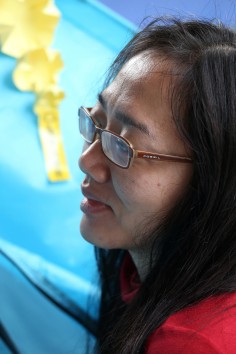
For years, 42-year-old Alice Chan rarely took part in protests, citing a fatalistic belief that "Hong Kong is already dead". But that changed when police fired tear gas at Occupy protesters on September 28.
"When the Tiananmen crackdown happened, I was watching television. Images of the tear gas this time reminded me of watching the Beijing crackdown as a student," the office worker said.
"If I don't come out and fight for democracy this time, there won't be a second chance. The students are so young yet they have been at the forefront of the movement. As an adult I must come out too."
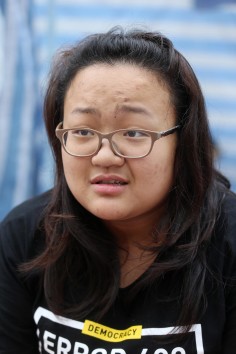
"I still have the rest of my life to make money. I needed to come out and contribute to help the city make democratic progress," said Ng, who has been helping out at a resource centre for protesters in Admiralty.
As protesters brace themselves for the clearance of their site today, Ng has been visiting Sham Shui Po to give away food donated to protesters to the homeless.
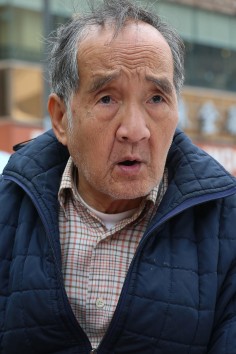
Gregory Lo was easy to spot among the predominantly young Occupy protesters. Now in his 70s, he joined the Occupy movement because of what he called police brutality and due to his discontent with the "incompetent" government.
"Leaving this place [Admiralty] does not mean that the fight for democracy is over. We have planted many seeds in terms of raising awareness. This movement is definitely a success," he said.
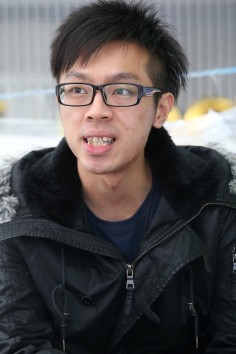
Sam Hui Kai-chun, a final-year nursing student at Polytechnic University, said the spirit shown by protesters during the Occupy movement had lifted his belief in Hongkongers.
"In the first one to two weeks, when there were a lot of people here in Admiralty, I felt like this place was a utopia. Everyone was so friendly and kind in helping each other out," he said. Hui, who has been working as a first-aider for the movement, said he could not believe police used batons against protesters.
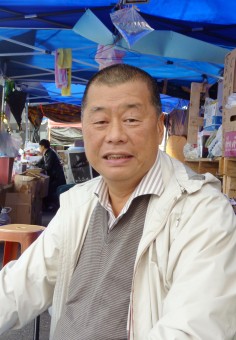
"The most precious thing that came out of this movement is that Hong Kong discovered and woke up a whole generation that will continue the fight for democracy," he said. Lai said large-scale sit-ins or similar Occupy protests are not likely in the future. "It'll be hard to gather enough momentum and have enough organisation to do something this big again," he said. "I believe future actions will be a lot like the [Mong Kok shopping] movement, or the likes of it ... people stopping to tie their shoelaces in the middle of the street, people going shopping - very grass roots and ad hoc."
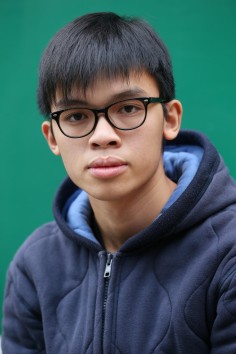
He admitted that some of the group's strategies had not panned out as hoped, but every mistake they made was a learning process.
"An old protester once encouraged us by saying that we are still young, and that we need to keep learning and have faith in ourselves."

"Democracy will not just come after a single campaign. But we have aroused the concern of many people on the matter," he said.
"I have gained so many happy memories here and have made many friends. Even after this movement ends, we will all stay in touch and remain friends."
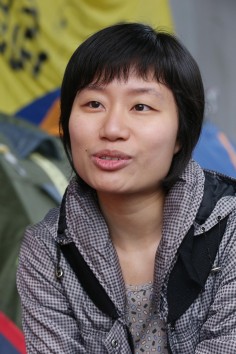
"It was so cold that night. I woke up and found that someone had put a shirt on me," said Ho. "At that moment I felt so warm."
- Joined
- Sep 25, 2013
- Messages
- 127
- Points
- 0
Re: UN supports HK protestors!!!
Admiralty small business owners express relief as police tear down Occupy barriers
PUBLISHED : Thursday, 11 December, 2014, 4:04pm
UPDATED : Friday, 12 December, 2014, 2:15am
Sarah Karacs and Elizabeth Cheung
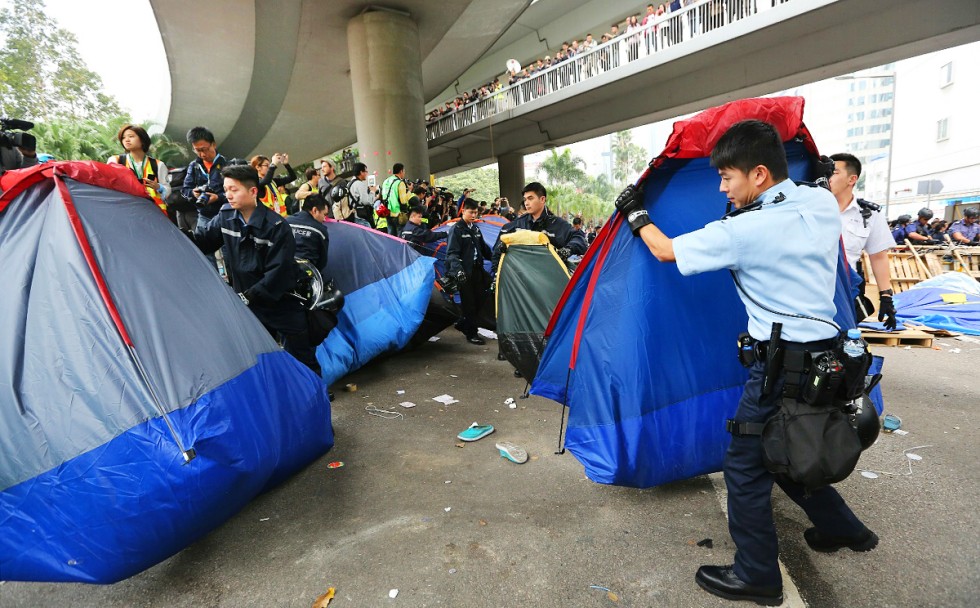
Police remove tents and barriers at the Occupy camp in Admiralty. Photo: Felix Wong
Owners and employees of small businesses near the Admiralty Occupy camp expressed relief today as police began dismantling barriers during a site clearance.
Some owners said that customer numbers had almost halved since pro-democracy protests began in late September.
"These students have to go. We used to have around 20 customers a day, now only about 10 come in because there are no taxis and people can't park outside," said Mary Yuen, owner of the Calina salon, based in the Bank of America Tower.
"Over the last two months, we've lost 25 per cent in revenue - that's about HK$30,000. We need to talk to the landlord about paying rent - to see if she'll give us some leniency - but we're not sure if we can afford to get the contract renewed.
"If I could speak to the students now I would say: 'Please go - you've made your point, now go home'."
An employee at a sweet shop called Treasure echoed Yuen's sentiments. She said the store had struggled to receive deliveries since the protests began.
"Our customers don't come because they are scared of all the trouble and all the 'children' outside. And our deliveries won't come - they say they want to wait until it is safer. I can't fill these hampers," said employee Ponti Li, adding that she was "angry" with the protesters.
"What am I supposed to do - call up my customers and tell them we can't deliver to them today because we don't have enough chocolate? We've had around 20 deliveries postponed because of Occupy, and lost about 50 per cent of revenue.
"I'm very happy [the police] are clearing the area. I hope the protesters never come back."
However, not all shop owners shared Li and Yuen's enthusiasm for the police clearance, which was triggered by a court injunction granted to a cross-border bus company.
K.C. Leung, a tailor at British Textiles on the third floor of the Bank of America Tower, said that although the shop's profits were down 10 per cent since Occupy began, he supported the students' bid for free elections.
"I understand why they're there and I hope they will come back again," he said.
Some business owners said they were worried that the students would return.
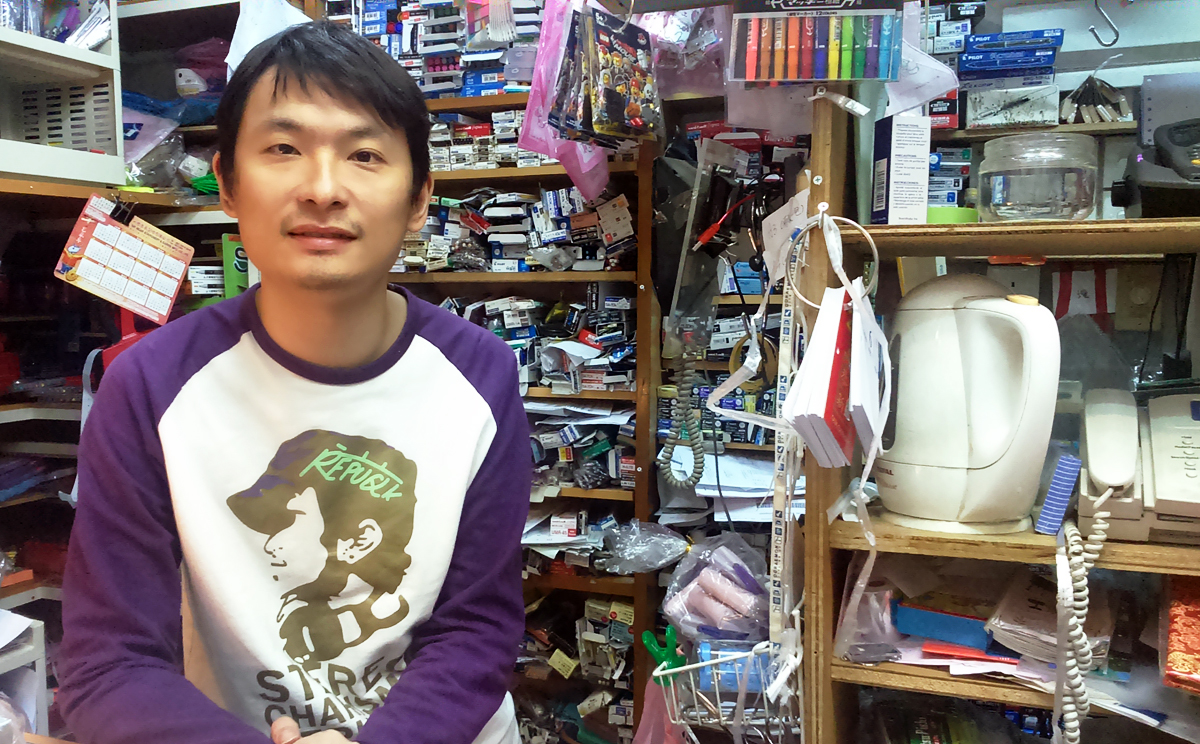
Stationery shop owner Kenny Ho said he hoped “the flow of customers would return” after the Occupy camp was dismantled. Photo: Elizabeth Cheung
"They said: 'We will be back.' If it happens, our business will be affected again," said Kenny Ho, owner of a stationery shop in the Admiralty Centre, which has experienced a 20 per cent drop in sales since late September.
Ho said he hoped "the flow of customers would return" after the clearance.
Office workers in the area said they were looking forward to the return of full public-transport services, bringing back the convenience they enjoyed before the protests began.
Jay Law, who used to take a 20-minute bus ride from her home in the Mid-Levels to her office in Admiralty before the Occupy movement started, has had to walk 30 minutes to work.
"I did not manage to find a mode of transport that was faster than walking. Now I just take my sports shoes with me and walk," she said.
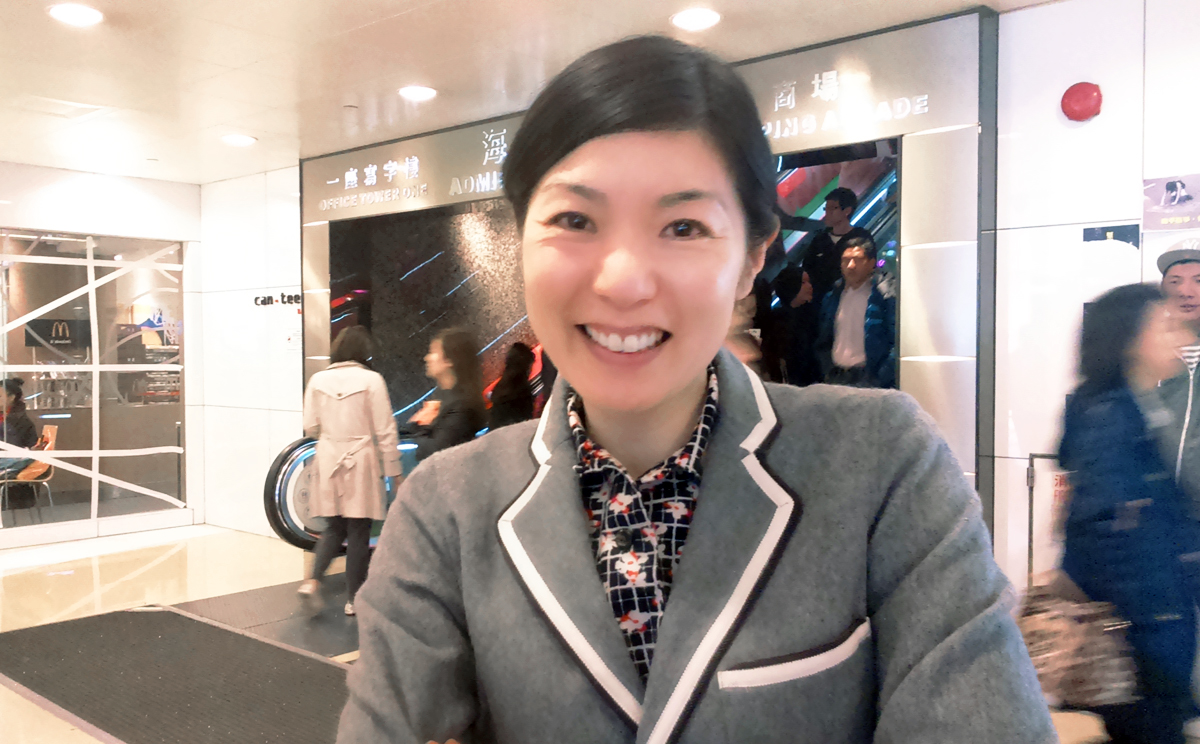
Jay Law has walked to work since protests began. Photo: Elizabeth Cheung
William Wong, who also works close to the rally site in Admiralty, hoped there would be fewer traffic jams in the area after the students left.
He said commuters who used to take the bus had flocked to the MTR, putting pressure on the railway system.
"It is really congested in the [Admiralty] MTR station now. I hope I can get to work more conveniently after the clearance," Wong said.
Admiralty small business owners express relief as police tear down Occupy barriers
PUBLISHED : Thursday, 11 December, 2014, 4:04pm
UPDATED : Friday, 12 December, 2014, 2:15am
Sarah Karacs and Elizabeth Cheung

Police remove tents and barriers at the Occupy camp in Admiralty. Photo: Felix Wong
Owners and employees of small businesses near the Admiralty Occupy camp expressed relief today as police began dismantling barriers during a site clearance.
Some owners said that customer numbers had almost halved since pro-democracy protests began in late September.
"These students have to go. We used to have around 20 customers a day, now only about 10 come in because there are no taxis and people can't park outside," said Mary Yuen, owner of the Calina salon, based in the Bank of America Tower.
"Over the last two months, we've lost 25 per cent in revenue - that's about HK$30,000. We need to talk to the landlord about paying rent - to see if she'll give us some leniency - but we're not sure if we can afford to get the contract renewed.
"If I could speak to the students now I would say: 'Please go - you've made your point, now go home'."
An employee at a sweet shop called Treasure echoed Yuen's sentiments. She said the store had struggled to receive deliveries since the protests began.
"Our customers don't come because they are scared of all the trouble and all the 'children' outside. And our deliveries won't come - they say they want to wait until it is safer. I can't fill these hampers," said employee Ponti Li, adding that she was "angry" with the protesters.
"What am I supposed to do - call up my customers and tell them we can't deliver to them today because we don't have enough chocolate? We've had around 20 deliveries postponed because of Occupy, and lost about 50 per cent of revenue.
"I'm very happy [the police] are clearing the area. I hope the protesters never come back."
However, not all shop owners shared Li and Yuen's enthusiasm for the police clearance, which was triggered by a court injunction granted to a cross-border bus company.
K.C. Leung, a tailor at British Textiles on the third floor of the Bank of America Tower, said that although the shop's profits were down 10 per cent since Occupy began, he supported the students' bid for free elections.
"I understand why they're there and I hope they will come back again," he said.
Some business owners said they were worried that the students would return.

Stationery shop owner Kenny Ho said he hoped “the flow of customers would return” after the Occupy camp was dismantled. Photo: Elizabeth Cheung
"They said: 'We will be back.' If it happens, our business will be affected again," said Kenny Ho, owner of a stationery shop in the Admiralty Centre, which has experienced a 20 per cent drop in sales since late September.
Ho said he hoped "the flow of customers would return" after the clearance.
Office workers in the area said they were looking forward to the return of full public-transport services, bringing back the convenience they enjoyed before the protests began.
Jay Law, who used to take a 20-minute bus ride from her home in the Mid-Levels to her office in Admiralty before the Occupy movement started, has had to walk 30 minutes to work.
"I did not manage to find a mode of transport that was faster than walking. Now I just take my sports shoes with me and walk," she said.

Jay Law has walked to work since protests began. Photo: Elizabeth Cheung
William Wong, who also works close to the rally site in Admiralty, hoped there would be fewer traffic jams in the area after the students left.
He said commuters who used to take the bus had flocked to the MTR, putting pressure on the railway system.
"It is really congested in the [Admiralty] MTR station now. I hope I can get to work more conveniently after the clearance," Wong said.
- Joined
- Sep 25, 2013
- Messages
- 127
- Points
- 0
Re: UN supports HK protestors!!!
Summon Chinese ambassador over Hong Kong entry ban, British MPs urge David Cameron
PUBLISHED : Thursday, 11 December, 2014, 4:43pm
UPDATED : Thursday, 11 December, 2014, 9:57pm
Alice Woodhouse [email protected]
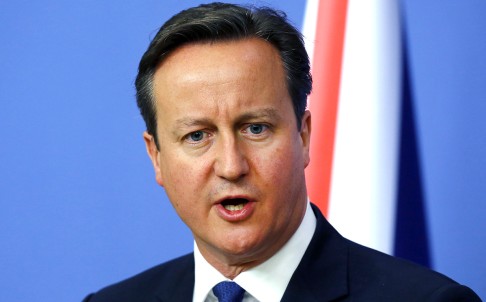
David Cameron’s spokesman said earlier this month that the British prime minister thought Beijing's decision to bar MPs from Hong Kong was counter-productive. Photo: Reuters
British MPs called on Prime Minister David Cameron to summon China’s UK ambassador on Wednesday following Beijing’s refusal to allow them to visit Hong Kong.
The lawmakers claimed the British government’s response had been too weak when Beijing’s deputy ambassador to London said members of an inquiry into post-handover relations would not be permitted to enter the city last month amid pro-democracy protests.
“The British government should react more strongly to this unprecedented and overtly confrontational act, including by summoning the Chinese ambassador to the [Foreign and Commonwealth Office],” said House of Commons Foreign Affairs Committee chairman Richard Ottaway.
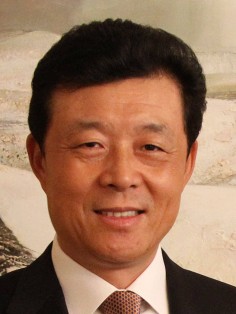
China’s ambassador to London, Liu Xiaoming, warned British MPs that issues related to Hong Kong were China’s internal affairs. Photo: SCMP Pictures
On November 28, China’s deputy ambassador to Britain, Ni Jian, told Ottaway the delegation would not be granted entry to Hong Kong, adding that Beijing did not want to send the wrong message to Occupy Central protesters.
British nationals do not require a visa to visit Hong Kong.
A three-hour emergency debate on the travel ban was held in the British parliament on December 2, but the committee viewed this as insufficient.
“The Chinese government’s decision to prevent the Foreign Affairs Committee entering Hong Kong is an insult to the House of Commons and the UK as a whole,” Ottaway said. “We do not think the FCO’s response has gone far enough.”
Cameron’s spokesman said earlier this month that the prime minister thought the decision was counter-productive.
In a report published on Wednesday, the committee called on the Foreign Office to raise the matter with partners in the European Union.
The committee launched the inquiry in July to examine Britain’s relations with Hong Kong 30 years after signing the Sino-British Joint Declaration.
China’s ambassador to London, Liu Xiaoming, wrote to the committee in July to warn that issues related to Hong Kong were China’s internal affairs.
The committee’s visit has been postponed but it has said it will continue to take evidence, possibly including by video link.
The committee said it will engage with Beijing and Hong Kong authorities in the hope of rescheduling a visit.
Summon Chinese ambassador over Hong Kong entry ban, British MPs urge David Cameron
PUBLISHED : Thursday, 11 December, 2014, 4:43pm
UPDATED : Thursday, 11 December, 2014, 9:57pm
Alice Woodhouse [email protected]

David Cameron’s spokesman said earlier this month that the British prime minister thought Beijing's decision to bar MPs from Hong Kong was counter-productive. Photo: Reuters
British MPs called on Prime Minister David Cameron to summon China’s UK ambassador on Wednesday following Beijing’s refusal to allow them to visit Hong Kong.
The lawmakers claimed the British government’s response had been too weak when Beijing’s deputy ambassador to London said members of an inquiry into post-handover relations would not be permitted to enter the city last month amid pro-democracy protests.
“The British government should react more strongly to this unprecedented and overtly confrontational act, including by summoning the Chinese ambassador to the [Foreign and Commonwealth Office],” said House of Commons Foreign Affairs Committee chairman Richard Ottaway.

China’s ambassador to London, Liu Xiaoming, warned British MPs that issues related to Hong Kong were China’s internal affairs. Photo: SCMP Pictures
On November 28, China’s deputy ambassador to Britain, Ni Jian, told Ottaway the delegation would not be granted entry to Hong Kong, adding that Beijing did not want to send the wrong message to Occupy Central protesters.
British nationals do not require a visa to visit Hong Kong.
A three-hour emergency debate on the travel ban was held in the British parliament on December 2, but the committee viewed this as insufficient.
“The Chinese government’s decision to prevent the Foreign Affairs Committee entering Hong Kong is an insult to the House of Commons and the UK as a whole,” Ottaway said. “We do not think the FCO’s response has gone far enough.”
Cameron’s spokesman said earlier this month that the prime minister thought the decision was counter-productive.
In a report published on Wednesday, the committee called on the Foreign Office to raise the matter with partners in the European Union.
The committee launched the inquiry in July to examine Britain’s relations with Hong Kong 30 years after signing the Sino-British Joint Declaration.
China’s ambassador to London, Liu Xiaoming, wrote to the committee in July to warn that issues related to Hong Kong were China’s internal affairs.
The committee’s visit has been postponed but it has said it will continue to take evidence, possibly including by video link.
The committee said it will engage with Beijing and Hong Kong authorities in the hope of rescheduling a visit.
- Joined
- Sep 25, 2013
- Messages
- 127
- Points
- 0
Fallout from umbrella movement's democracy protests shows Hong Kong needs a new heart
Stephanie Cheung says the intolerance and hatred engulfing society emanates from the top, so it is now up to our leaders to ensure peace is restored
PUBLISHED : Thursday, 11 December, 2014, 5:59pm
UPDATED : Thursday, 11 December, 2014, 7:59pm
Stephanie Cheung
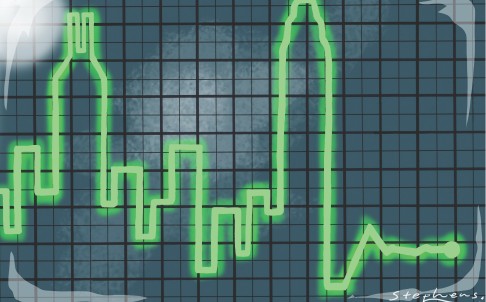
If we are not careful, Hong Kong will be suffocated by a negative spirit.
Whether one likes it or not, the umbrella movement has given Hong Kong a new spirit. Unlike the old spirit, whose raison d'être is economic development founded on political and social stability, this new spirit is based on non-financial values.
Chief Executive Leung Chun-ying is correct in describing Occupy as a social movement on an unprecedented scale. No one in Hong Kong has been untouched by it, be they taxi or bus drivers, shopkeepers, students, politicians, or my vegetable vendor. Each espouses a personal theory on the whys and wherefores of the movement, whichever colour they side with.
In short, the umbrella movement has awakened in the city an interest for something deeper than merely eking out a living, and using the financial rewards to engage in shopping, entertainment and social gossip - that is, if one still has energy left after coping with the education concerns of one's children.
This new spirit is daring, iconoclastic and out of the box. Possibilities abound. Who, before the movement, would have dreamt of sleeping under the stars in the middle of Harcourt Road? Or sung to the strains of
Beyond in unison with tens of thousands in a sea of waving iPhone torch lights? Or imagined they would be living in a village-like community in a spirit of brotherly fellowship? Or, see students sit across the table in a televised debate with government officials?
From a positive viewpoint, this new spirit is filled with ideals and new ambition. It is free from the shackles of orthodox norms, innovative and bursting with energy. This spirit sparks a yearning in the souls of men for something deeper, and bigger than themselves. It moves people from beyond the humdrum of their daily existence and offers imagination and adventure.
Yet from a negative viewpoint, this new spirit, if unbridled, will break through all legitimate boundaries and become an undisciplined destructive force.
As the movement drags out, stress, fatigue, criticism and the dark side of human nature have begun to percolate through this new spirit.
If we are not careful, Hong Kong will be suffocated by a negative spirit - one of intolerance, which regards people with different views as opponents across a courtroom, or downright enemies to be clamped down on without remorse.
In the past two months, we have seen tear gas, pepper spray and batons used by police on civilians with a degree of violence to which Hong Kong is not accustomed. Mistakes and momentary lapses could be forgiven in repeated high-stress situations, but what is troubling is that certain incidents, if reports are true, would appear to be calculated evil with malice aforethought. Incidents include the alleged molesting of the private parts of student leader Joshua Wong when he was taken into police custody, and a group of off-duty policemen reportedly leering at female students at Admiralty and threatening to take them to the police station to be raped.
One hopes there is a rational explanation for such uncharacteristic police behaviour and not just the blind venting of frustration, in a spirit of retribution.
Yet it is not only the police. This unloving attitude comes from the top, seemingly a strategy to provoke division in the community. From words of contempt for the poor, to accusing sportsmen and religious personnel of making no contribution to society, such speech is socially divisive and discriminatory, with the opposite intent of forging a spirit of unity and harmony.
Officials are pressed into taking sides to sign their support for the blue ribbon camp of anti-occupiers, instead of fulfilling their roles as public servants indiscriminately of the political views of those they serve. On the streets, blue ribbon protesters have blared out personal insults and vicious curses through megaphones, in heated displays of anger and animosity.
Rumour and slander abounds, not rational discussion. Where is the evidence of foreign instigation we were promised? What prompts untrue reports that student leaders have been paid and granted scholarships in overseas universities? And, of course, it was a false report on "cyber Article 23" that prompted the violent attack on the Legislative Council.
Protestors have also strayed off their original path of peace and love in an attempt to force a breakthrough. With such large numbers involved, without a single acknowledged leadership, the movement is vulnerable to hijack by those more prone to violence.
This line of intolerance, slander, enmity and hatred is like poison contaminating Hong Kong society. On Facebook, at dinner tables and family outings, a division of opinions over the movement has led to strained, sometimes broken, relationships.
Hong Kong needs a new heart. It is the antidote to counteract the poisonous spirit. It is a heart of loving care for the community, which treats all as part of the same family - not as enemies to be humiliated and annihilated.
It is a heart of liberal tolerance, in listening carefully with patience to one another with a willingness to distil what is common ground, and agreeing to disagree on what cannot be agreed. It is a heart of peace and compassion, with goodwill towards fellow men. Such a heart is willing to reach out without being defensive or proud.
It is a heart that can say, "Even though I don't condone your unlawful conduct in pushing for your unreasonable demands, I do not wish to see your health damaged. Let us meet", or "We both love Hong Kong and its people. Hong Kong's future matters to both of us. Let's try and work something out that is feasible and benefits us all."
Leaders of the Occupy movement have turned themselves in to the police, to take responsibility for their role, and leaders of the Federation of Students have confessed to their wrong decision to storm police lines. Irrespective of whether one agrees with their views, they have at least shown courage and retrospective ability over their own actions and attitudes.
It behoves our government leaders - the only group of players in this saga who are actually paid for their roles - to show similar, if not a higher degree of retrospection and courage.
Political dissent should be solved through discussion and understanding, not by clamping down through superior power, as the latter will bring only resentment and a lack of co-operation.
In the final analysis, it is kindness that brings about persuasion and peace. Having passed the unpopular buck of solving the problem from the police to the courts, our leaders now have a duty to carry out discussions so a social consensus can be forged to bring about peace, harmony and progress in society.
Stephanie Cheung participated in the student movements in the 1970s, and is currently a solicitor and mediator, and volunteer in youth work and education
- Joined
- Sep 25, 2013
- Messages
- 127
- Points
- 0
Orderly end to Hong Kong’s Occupy Central movement after 75 days of turmoil
Police end Admiralty sit-in, but students vow to fight on, predicting a 'second wave of occupation'
PUBLISHED : Thursday, 11 December, 2014, 11:37pm
UPDATED : Friday, 12 December, 2014, 2:14am
Staff Reporters
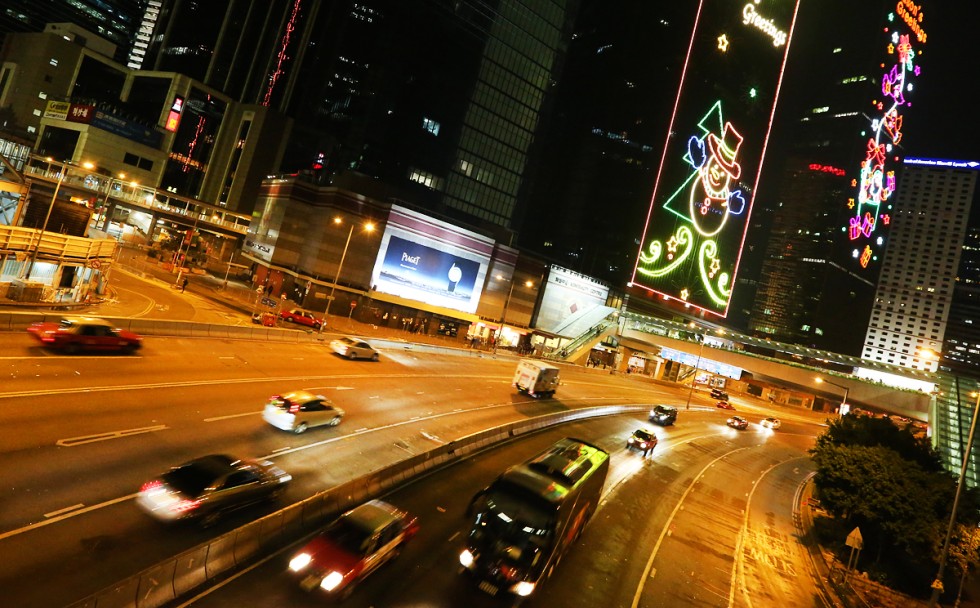
Traffic resumes for the first time in more than two months. Photo: Nora Tam
The police ended the main sit-in of the Occupy movement in Admiralty yesterday with the arrest of 247 people, including politicians, student leaders and a pop star. Traffic through the area resumed 75 days after the occupation started.
However, student leaders vowed to continue their prodemocracy cause in other ways after Christmas.
Monitored by members of the police watchdog and more than 200 local and international journalists, the seven-hour police operation proceeded without any clashes between officers and protesters, unlike in the clearance operation in Mong Kok.
By 11pm, all traffic on Harcourt Road had resumed.
Police cordoned off the camp along Harcourt Road at 2.20pm, after court bailiffs cleared the roads covered by an injunction which applied to one-fifth of the area. By that time, more than 100 protesters had started a sit-in on the road, waiting to be arrested.
Speaking at the sit-in before he was arrested, Federation of Students secretary general Alex Chow Yong-kang said: "I would not say … the movement ends with victory, but I don't think we have failed either."
He expected a "second wave of occupation" would happen in the coming months, when people protest at public forums during the second stage of public consultation on political reform.
Other sit-in participants included Democratic Party founding chairman Martin Lee Chu-ming, Apple Daily boss Jimmy Lai Chee-ying, Canto-pop singer Denise Ho Wan-see and nine members of the federation.
There were also ordinary citizens like Au Yeung Siu-hung, 67, who had been protesting in Admiralty every day over the past two months. Au said he was there to "fulfil the spirit of civil disobedience by shouldering the legal consequences" - in the words of the three Occupy Central founders who turned themselves in to police last week.
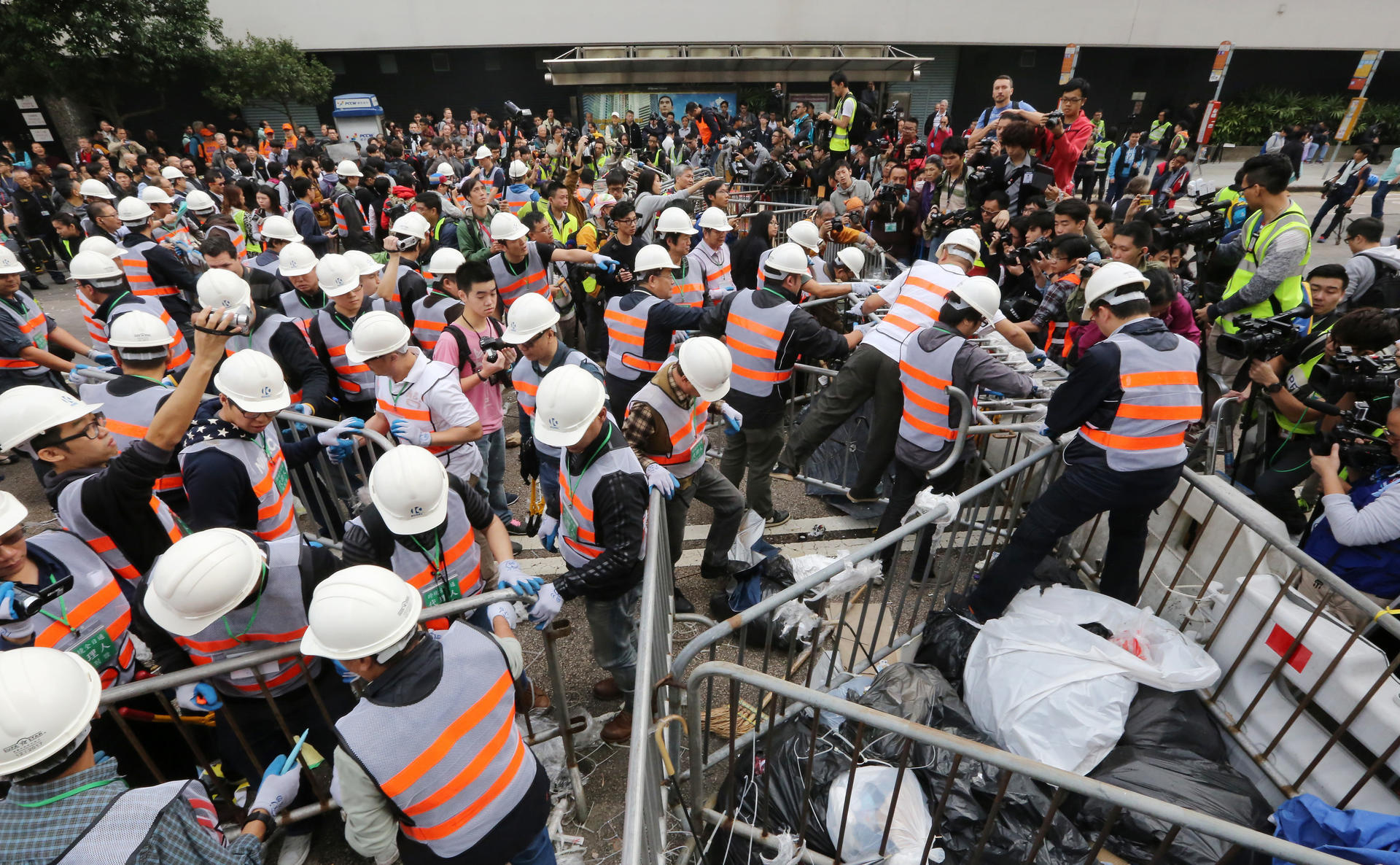
Workers clear barricades at the Admiralty Occupy site. Photo: Felix Wong
A government spokesman said the occupation was a "severe blow to the economy, politics, society and people's livelihood".
He expressed "gratitude" to the police force for their hard work, while urging the public to abide by the law in expressing their views in future. Executive councillors made the same appeal in a joint statement.
Lester Shum, Chow's deputy, said the clearance would not mark an end to their fight for genuine universal suffrage.
"I believe what the government has lost is not only the support of young people, but also Hongkongers," he said as he gathered with dozens outside Kwai Chung police station last night, where the first batch of those arrested were being held.
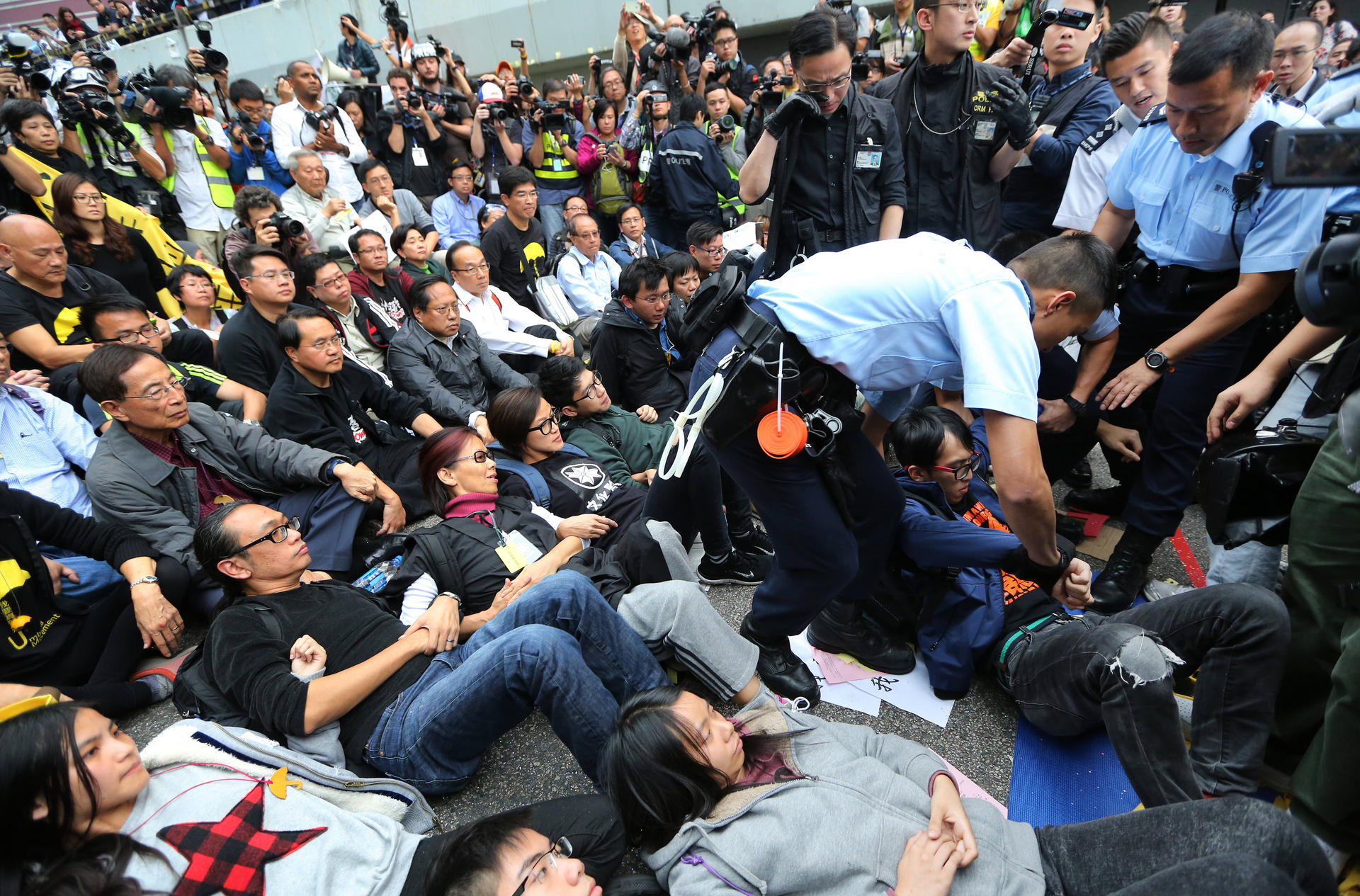
Police officers remove remaining protesters. Photo: Sam Tsang
About 7,000 officers were deployed in two shifts for the clearance operation, and 909 protesters who left voluntarily after the area was sealed off at 2.20pm had their details taken. A police source said the remaining Occupy site in Causeway Bay would probably be cleared next week as the priority was to make sure that Admiralty was not reoccupied.
Some owners of businesses near the Occupy camp and workers affected by traffic jams expressed relief, while worrying that protesters would return.
Chung Kim-wah, director of Polytechnic University's Centre for Social Policy Studies, said Leung Chun-ying's administration would not find governance easier despite the end of Occupy, which he added had "torn society apart".
Danny Lee, Emily Tsang, Phila Siu, Jennifer Ngo, Joyce Ng, Peter So, Alan Yu, Samuel Chan, Clifford Lo and Timmy Sung
- Joined
- Sep 25, 2013
- Messages
- 127
- Points
- 0
Denise Ho first celebrity to be arrested at protest site
PUBLISHED : Friday, 12 December, 2014, 2:51am
UPDATED : Friday, 12 December, 2014, 2:51am
Vivienne Chow and Danny Lee
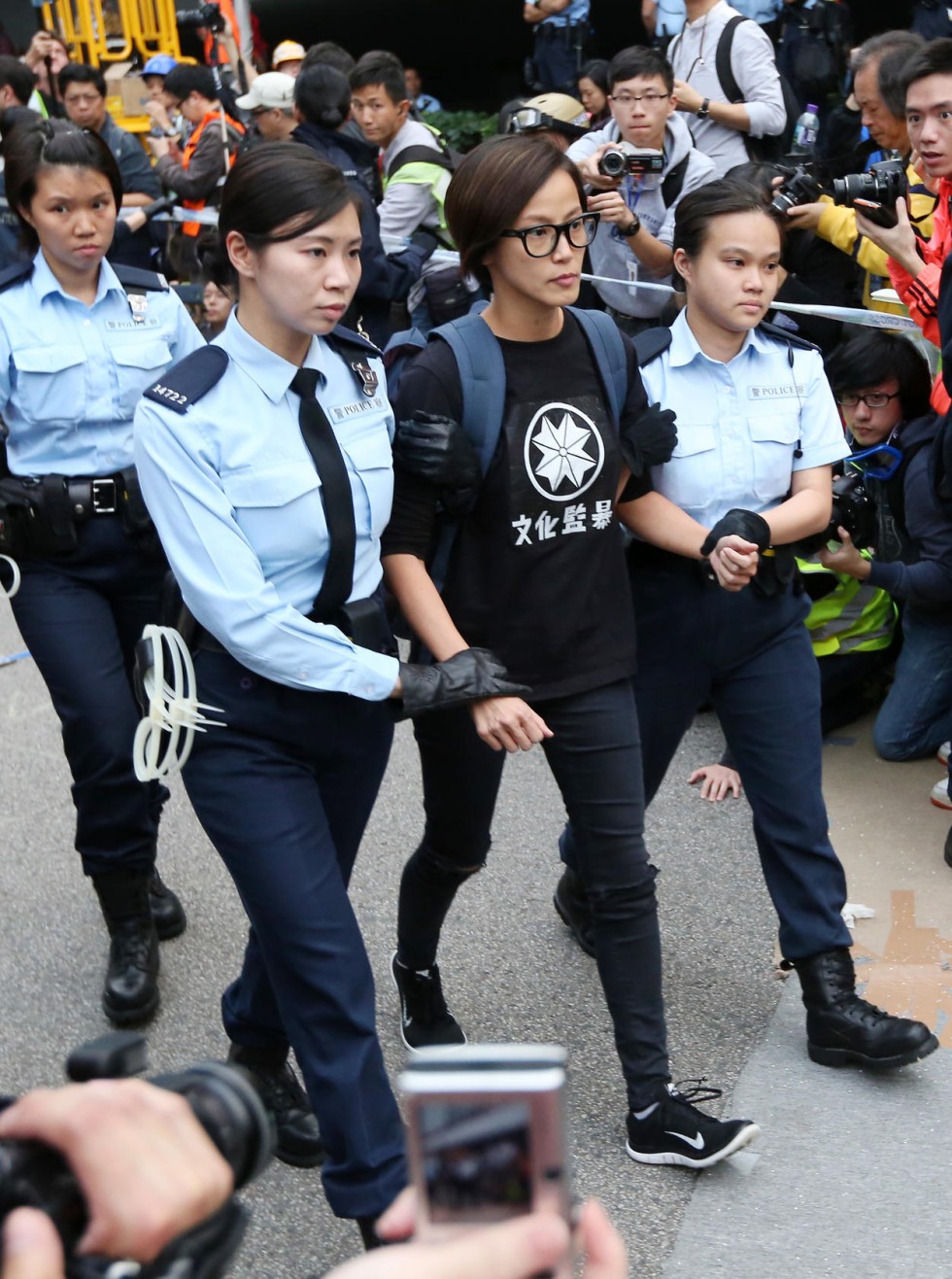
Denise Ho first celebrity to be arrested at protest site
Canto-pop singer Denise Ho Wan-see was arrested yesterday during the police clearance of Admiralty, making her the first Hong Kong celebrity to be hauled away for taking part in the pro-democracy movement.
A cultural critic said the arrest of a high-profile celebrity standing at the forefront of a pro-democracy battle was a symbolic moment as it sent a wake-up call to a society that has placed money on a higher priority than moral values and social justice.
Yesterday morning, Ho, a co-founder of Hong Kong Shield, a voluntary group supporting the student-led protests, joined the sit-in in Admiralty.
"I'll wait to be arrested. There's not much of a plan - just sit here," she said. "But this is part of my responsibility as an adult and celebrity, to fill the responsibility of civil disobedience."
She was eventually taken away by officers at about 4.47pm.
As she sat on the pavement, she was read her legal rights by a policewoman before being removed.
Ho led the crowd in chanting: "Civil disobedience, we are fearless!"
The singer refused to be lifted by police like the others arrested, however, and the crowd cheered as she walked to a police car with two officers.
Ho, together with others arrested in Admiralty, was taken to Kwai Chung police station. Her publicist said Ho could not be reached but a lawyer was available to help the singer.
Critic Jimmy Pang Chi-ming said that during the 1960s, celebrities in Hong Kong had political affiliations. He said film studios that were pro-communists often competed with those supporting the Kuomintang. Film stars working under those studios had to declare their political stance.
"But making money became the focus in the 1980s, and the importance of politics had been downplayed," Pang said.
Although over 100 celebrities turned up for a concert to raise funds for the student pro-democracy protests in Tiananmen Square in 1989 - under the call of Ho's mentor, the late Canto-pop star Anita Mui Yim-fong - those in show business have distanced themselves from politics. Pang said that today, self-censorship in Hong Kong show business had become worse to please Beijing. "This just shows how cowardly showbiz is, and it takes no responsibility for the future generations," Pang said. "But Ho's move is significant, as she opens a new window to a different world to her followers."
- Joined
- Sep 25, 2013
- Messages
- 127
- Points
- 0
Re: China blocks bbc website after video shows hong kong police beating protester
Disheartened protesters express sadness as they leave Admiralty
Debris and discarded supplies strewn across area as disheartened protesters leave site
PUBLISHED : Friday, 12 December, 2014, 2:51am
UPDATED : Friday, 12 December, 2014, 2:51am
Jennifer Ngo [email protected]
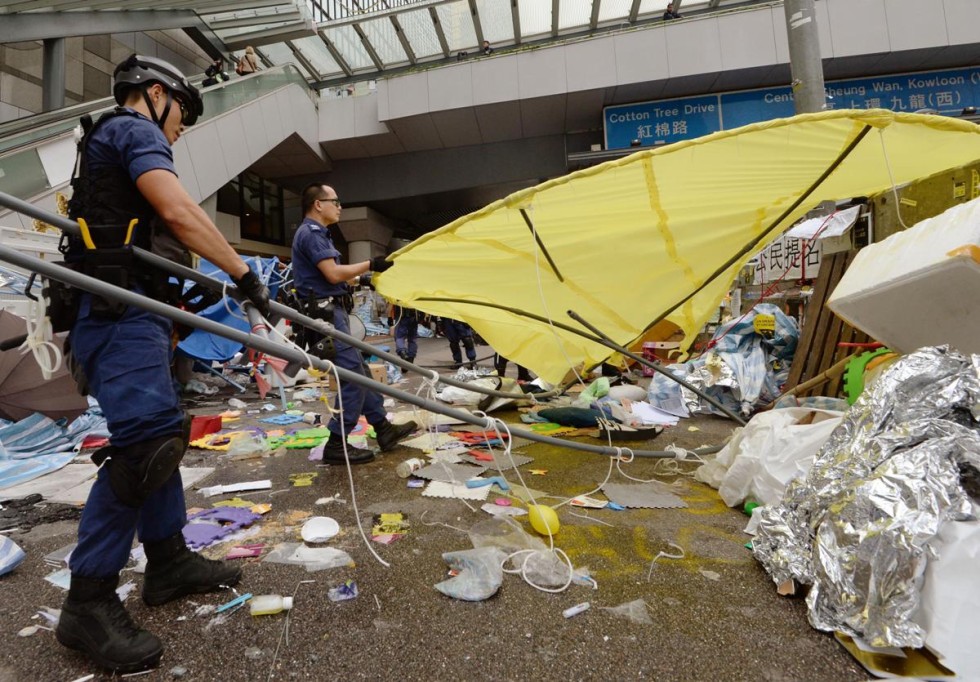
Police officers clear a large yellow umbrella at the Occupy site in Admiralty. Photo: Kyodo
It may have been anticipated, but the end left parts of Admiralty like a depressing ghost town.
Lone tents stood among emptied spaces, piles of leftover protest supplies were strewn across the road and scraps of wood and tarpaulin were scattered everywhere.
Most protesters had already cleared out their valuables and personal belongings in the morning, leaving behind items that they were prepared to discard.
Lunch hour brought in people planning to take their last photographs of the area, but once the police warned them to leave or be arrested, they quickly left, while other bystanders and the remaining protesters thinned out.
What was once a commune - with thousands of people passing through, leaving aspirations of genuine democracy on walls and befriending like-minded strangers - had turned into an almost desolate ghost town under the cloudy winter skies.
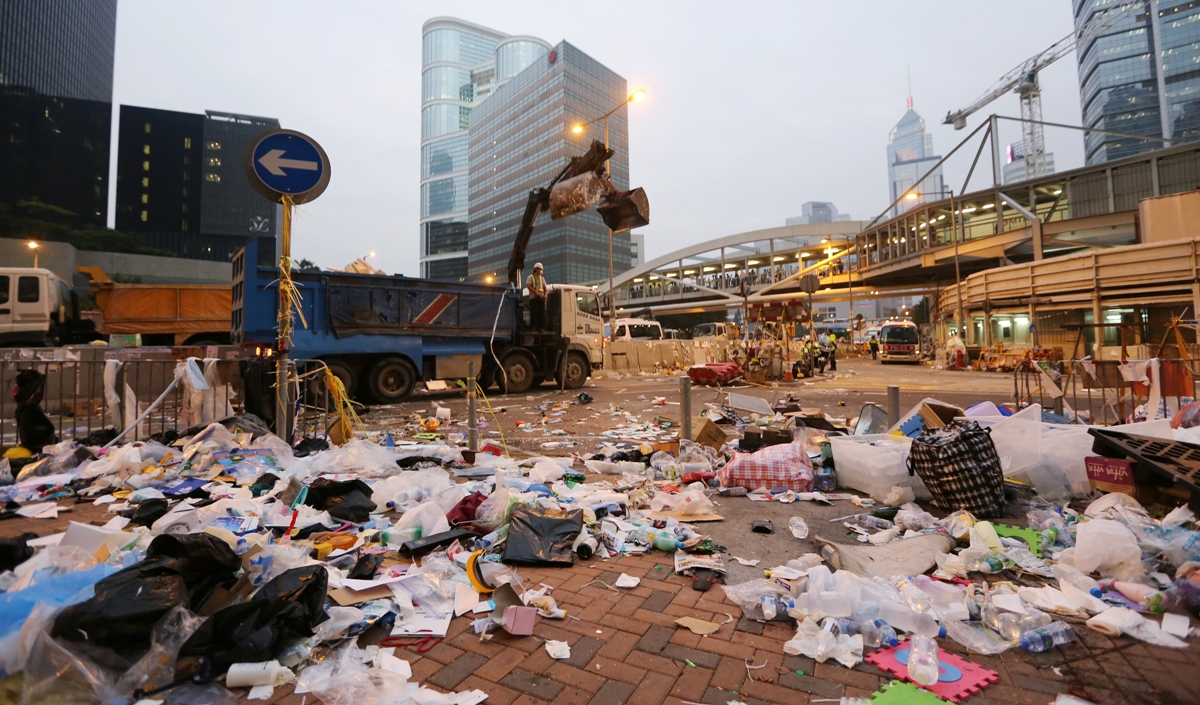
Police removed barricades and tore down tents at the Admiralty protest site. Photo: Felix Wong
The main stage that had hosted night rallies had been dismantled. So too had the green "I control my fate" platform outside the Legislative Council building.
Sitting amid the emptiness and debris, Vicky Hui, 22, and Alan Chan, 31, struggled to come to terms with the end of the protest.
"I'm feeling very sad that it has come to this," said Chan, a liberal studies teacher, who had packed up his tent. "I feel like nothing concrete has been achieved and we already have to leave this place. I hope we will move forward again."
Another protester, social worker Toby Ho Sze-man, said: "Admiralty has a special place in my heart. We started here even before Occupy was announced. It's very sad that this is the end."
But the art will live on.
Major artworks, including the "Lennon Wall" along Harcourt Road, have been saved along with some banners and installation pieces, in an effort to assemble an Occupy archive.
At the government offices, the walls which once glowed with layers of posters and post-it notes in support of the demonstrations, were collected by volunteers and returned to cold, grey concrete.
But someone later used colourful new post-its to spell out "We all dreamed" on the otherwise empty walls - a nostalgic reminder of the movement's dream for genuine democracy and equality.
Eventually, however, this last show of defiance was removed.
Disheartened protesters express sadness as they leave Admiralty
Debris and discarded supplies strewn across area as disheartened protesters leave site
PUBLISHED : Friday, 12 December, 2014, 2:51am
UPDATED : Friday, 12 December, 2014, 2:51am
Jennifer Ngo [email protected]

Police officers clear a large yellow umbrella at the Occupy site in Admiralty. Photo: Kyodo
It may have been anticipated, but the end left parts of Admiralty like a depressing ghost town.
Lone tents stood among emptied spaces, piles of leftover protest supplies were strewn across the road and scraps of wood and tarpaulin were scattered everywhere.
Most protesters had already cleared out their valuables and personal belongings in the morning, leaving behind items that they were prepared to discard.
Lunch hour brought in people planning to take their last photographs of the area, but once the police warned them to leave or be arrested, they quickly left, while other bystanders and the remaining protesters thinned out.
What was once a commune - with thousands of people passing through, leaving aspirations of genuine democracy on walls and befriending like-minded strangers - had turned into an almost desolate ghost town under the cloudy winter skies.

Police removed barricades and tore down tents at the Admiralty protest site. Photo: Felix Wong
The main stage that had hosted night rallies had been dismantled. So too had the green "I control my fate" platform outside the Legislative Council building.
Sitting amid the emptiness and debris, Vicky Hui, 22, and Alan Chan, 31, struggled to come to terms with the end of the protest.
"I'm feeling very sad that it has come to this," said Chan, a liberal studies teacher, who had packed up his tent. "I feel like nothing concrete has been achieved and we already have to leave this place. I hope we will move forward again."
Another protester, social worker Toby Ho Sze-man, said: "Admiralty has a special place in my heart. We started here even before Occupy was announced. It's very sad that this is the end."
But the art will live on.
Major artworks, including the "Lennon Wall" along Harcourt Road, have been saved along with some banners and installation pieces, in an effort to assemble an Occupy archive.
At the government offices, the walls which once glowed with layers of posters and post-it notes in support of the demonstrations, were collected by volunteers and returned to cold, grey concrete.
But someone later used colourful new post-its to spell out "We all dreamed" on the otherwise empty walls - a nostalgic reminder of the movement's dream for genuine democracy and equality.
Eventually, however, this last show of defiance was removed.
- Joined
- Sep 25, 2013
- Messages
- 127
- Points
- 0
Re: China blocks bbc website after video shows hong kong police beating protester
Occupy Central camp in Admiralty goes down quietly as police move in
No resistance as workers backed by 7,000 police clear out community that lasted 75 days, and hardcore protesters wait patiently to be arrested
PUBLISHED : Friday, 12 December, 2014, 2:51am
UPDATED : Friday, 12 December, 2014, 2:51am
Staff Reporters
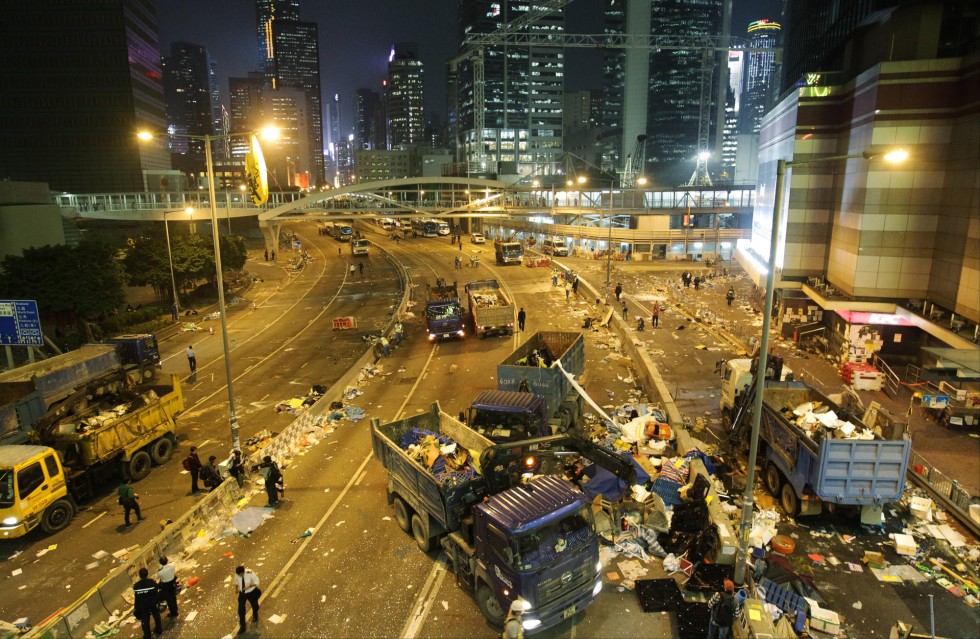
The scene last night after the clearance of the Occupy Central site in Admiralty. Photos: Dickson Lee, Felix Wong
The occupied site in Admiralty was cleared without resistance or any visible scuffles yesterday in a police operation that was described by a watchdog as "smooth and peaceful".
Last night, authorities were still working to return blocked roads to the way they were in late September before the "umbrella movement" for democracy erupted.
The colourful tents that once lined Harcourt Road - the busiest in the city centre - the creative banners and artworks that enlivened the space, the assorted chairs and beds, and the people who were behind it all - were gone after a day-long operation by police and bailiffs.
Among items torn down was a banner newly erected on road barriers that read: "It's just the beginning". Protesters released balloons lifting a banner that read: "We'll be back".
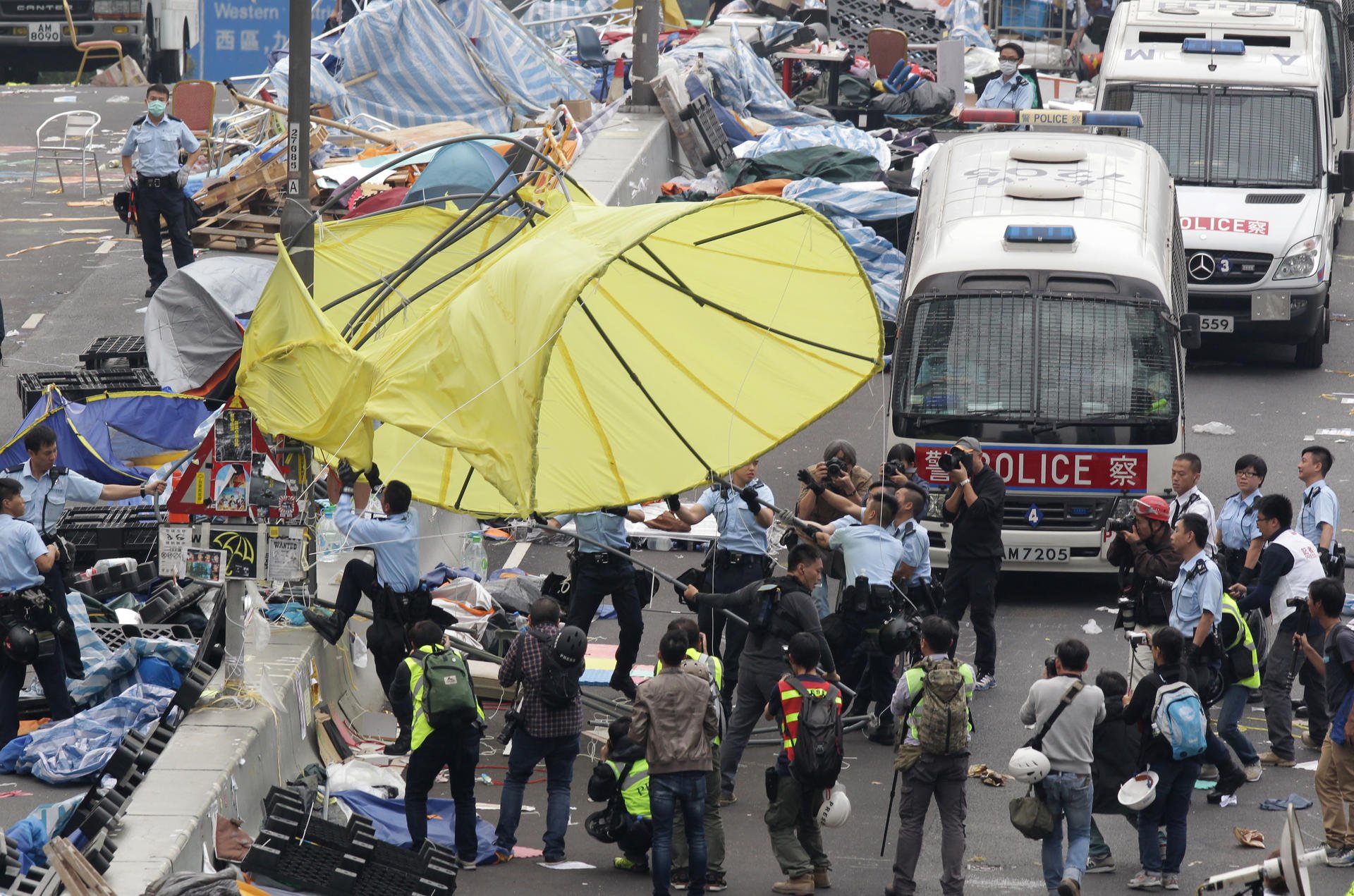
Police and workers took down a giant umbrella that had become a symbol for protesters.
Unlike the first clearance of Occupy, launched in Mong Kok last month, the Admiralty operation went ahead without brawls or bloodshed.
As many as 7,000 police officers were reportedly deployed yesterday.
Chief Secretary Carrie Lam Cheng Yuet-ngor praised the police action for its "high-level transparency" that would avoid any "misunderstanding" or "smearing".
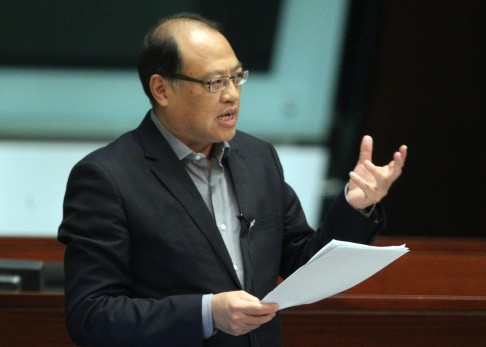
Lawmaker Lam Tai-fai says the clearance of Admiralty protest site was peaceful and all had been restrained.
Lam Tai-fai, lawmaker and vice-chairman of the Independent Police Complaints Council, also said the peaceful turn of events meant a "soft landing" for the end of the Occupy action.
"[We saw] no clashes, not even verbal arguments between police and protesters," he said. "Overall, it was peaceful and all had been restrained. We are glad to see the way it ended."
Lawmaker Helena Wong Pik-wan, who was in Admiralty with Lam Tai-fai from 8am, also said she felt protesters were given enough time to pack and leave.
But arrests of protesters who refused to budge did not end until 9.10pm. A total of 247 people were arrested.
Many had pledged to take full responsibility for their civil disobedience in the fight for democracy. Seven hours before the arrests began at 4.20pm, all were already seated calmly, chatting and laughing with one another from time to time.
The first to be arrested was believed to be a female student. Female officers read her the legal rights before carrying her away.
Political heavyweights Martin Lee Chu-ming and Audrey Eu Yuet-mee also lingered around for the arrests, as did celebrity singer Denise Ho Wan-see, pan-democratic lawmakers and student leaders.
Ho led the crowd in chanting: "Civil disobedience, we are fearless!" Unlike the other people arrested, she refused to be lifted off her feet, walking instead to a police car with two officers amid cheers from the crowd.
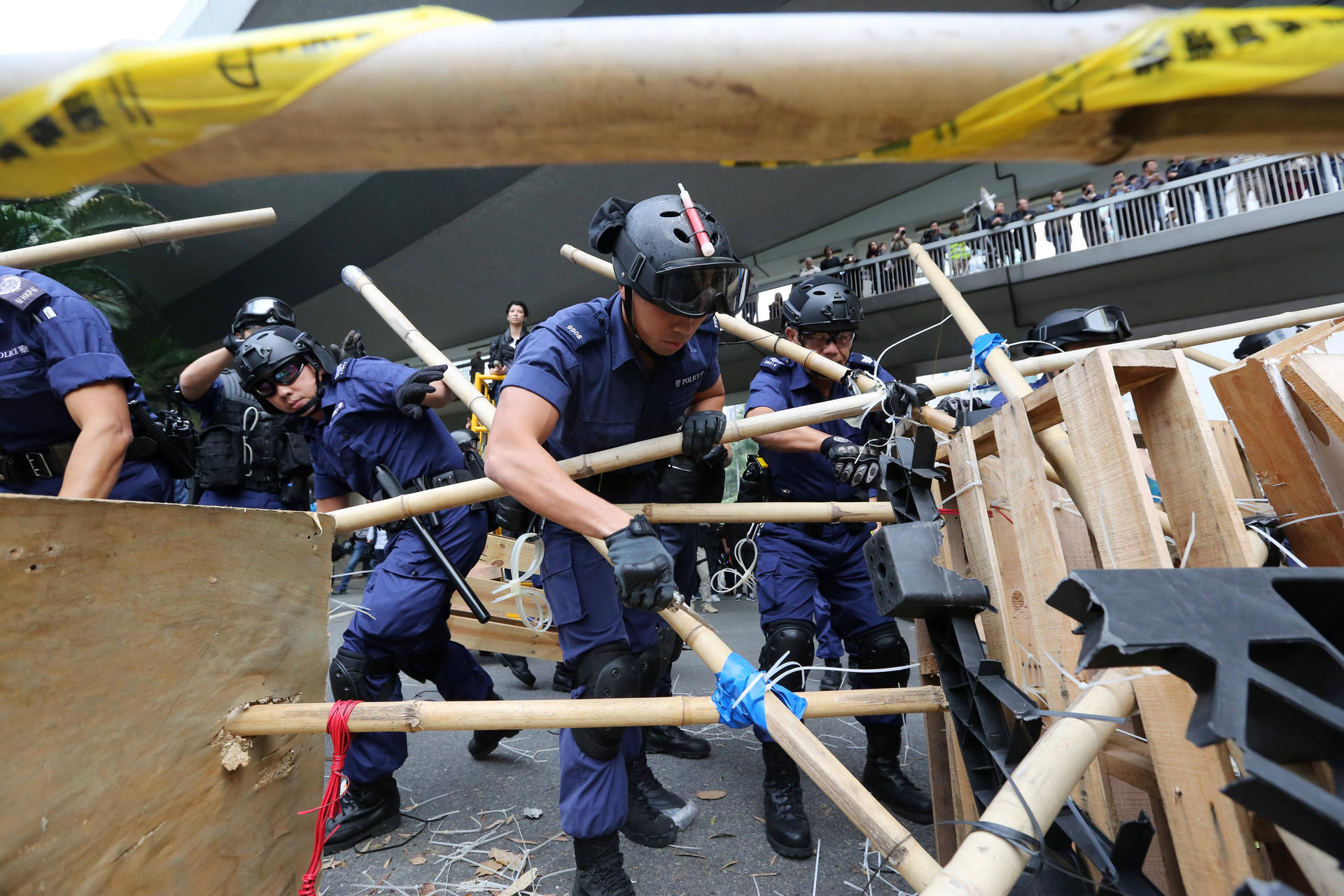
Police and workers demolished barricades.
The clearance ended the 75-day lifespan of a vibrant community equipped with a supply station, study area, workshop and first-aid centre.
The operation started officially at 9am, when about 50 workers, several bailiffs and lawyer Paul Tse Wai-chun - representing company All China Express - descended on the site and notified protesters about their enforcement of a High Court injunction granted to the cross-border bus operator.
Tse warned protesters that resistance would leave them liable to contempt of court.
The workers then started the demolition process, breaking the cement that glued barriers to the road surface at four locations.
It took much longer than expected for the bailiffs to finish clearing the areas covered by the court order - Connaught Road Central, Harcourt Road and Cotton Tree Drive - by which time it was about 1pm.
Police then took charge of clearing the remaining four-fifths of the occupied site.
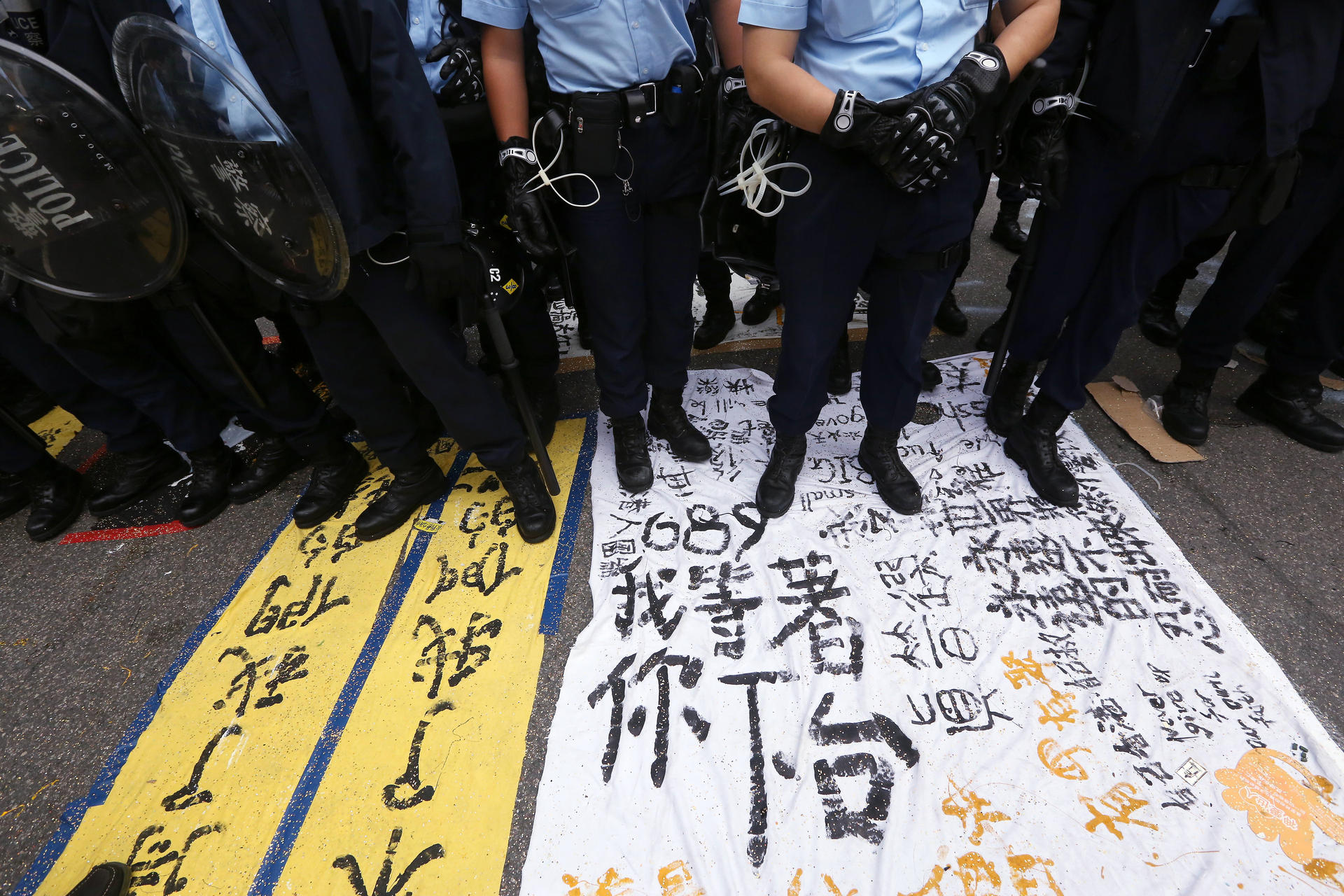
Senior superintendent Patrick Kwok Pak-chung issued an ultimatum for the remaining occupiers to leave before officers sealed off the area - from the Academy for Performing Arts to Connaught Road Central next to the Hong Kong Club - at 2.20pm.
More than 900 people who left voluntarily after that time - via a designated exit at Tim Mei Avenue - had to give their personal details to police for possible prosecution later.
At 2.20pm, uniformed officers began to march towards the core occupied area of Harcourt Road from the directions of Wan Chai, Central and Tim Mei Avenue. None of the men were heavily equipped, except for a special squad tasked with dismantling the more complicated barriers.
The only resistance they met was from a man who refused to budge from the Harcourt Road flyover. He was arrested and his hands bound with plastic ties.
Everything that the protesters once treasured, but was in the way of the officers, was eventually crane-lifted onto trucks. At one point last night, at least 10 trucks were working to remove the materials.
Police toppled a three-metre-long yellow umbrella installation - the symbol of the movement - and used saws and cutters to break it up into pieces.
And in just a few minutes, a supply station and workshop that was once covered by another yellow umbrella was reduced to a pile of debris.
As the officers walked towards the bridge next to the Admiralty Centre, they shoved aside abandoned tents, upturned desks and chairs and threw away anything left unattended.
Samuel Chan, Phila Siu, Emily Tsang, Elizabeth Cheung, Alan Yu and Danny Lee
__________________________________________________
How a newspaper commentary unfolded into months of protest
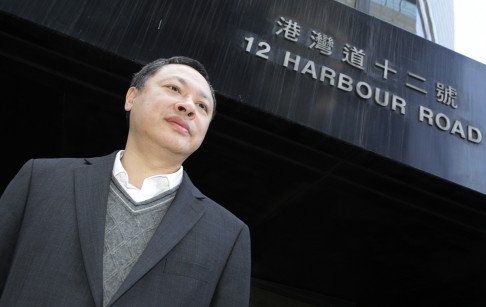
Benny Tai
2013
January 16 University of Hong Kong legal scholar Benny Tai Yiu-ting raises idea of Occupy Central civil disobedience in newspaper commentary
March 27 Tai, the Reverend Chu Yiu-ming of Chai Wan Baptist Church and Dr Chan Kin-man of Chinese University release Occupy manifesto
2014
June 20-29 Occupy holds "referendum" on three election models, all backing public nomination in 2017 chief executive poll
August 31 National People's Congress Standing Committee lays down framework for 2017 poll that critics say cannot ensure genuine universal suffrage
September 22 Federation of Students starts five-day class boycott
September 26 Student protesters break from rally outside government headquarters in Admiralty and scuffle with police. Scholarism convenor Joshua Wong Chi-fung is arrested
September 28 Tai declares start of Occupy protests. Police lose control of crowds and use 87 rounds of tear gas
September 29 Protesters block key roads in Central, Admiralty, Wan Chai, Causeway Bay and Mong Kok
September 30 Protesters urge Chief Executive Leung Chun-ying to resign
October 3 Scores of anti-Occupy activists storm Mong Kok streets and clash with protesters
October 20 High Court grants injunctions to transport groups and Citic Tower owner, ordering protesters in Mong Kok and parts of Admiralty to leave
October 21 Top officials and federation leaders reach no consensus in meeting to discuss electoral reforms
November 9 President Xi Jinping expresses support for Leung
November 15 Federation leaders' plans to petition state leaders in Beijing fall flat because mainland authorities revoke their re-entry permits
November 18 Masked people smash glass doors of Legislative Council and urge protesters to storm building
November 25 Authorities carry out first large-scale clearance operation, targeting Mong Kok
November 27 Radical protesters return to Mong Kok to stage so-called shopping rallies and clash with police
December 1 Scholarism members start hunger strike
December 3 Occupy's founding trio turn themselves in to police
December 8 Court grants injunction to bus company to remove blockades at Connaught Road Central, Harcourt Road and Cotton Tree Drive
December 11 Authorities conduct large-scale operation to free up Central and Admiralty
Occupy Central camp in Admiralty goes down quietly as police move in
No resistance as workers backed by 7,000 police clear out community that lasted 75 days, and hardcore protesters wait patiently to be arrested
PUBLISHED : Friday, 12 December, 2014, 2:51am
UPDATED : Friday, 12 December, 2014, 2:51am
Staff Reporters

The scene last night after the clearance of the Occupy Central site in Admiralty. Photos: Dickson Lee, Felix Wong
The occupied site in Admiralty was cleared without resistance or any visible scuffles yesterday in a police operation that was described by a watchdog as "smooth and peaceful".
Last night, authorities were still working to return blocked roads to the way they were in late September before the "umbrella movement" for democracy erupted.
The colourful tents that once lined Harcourt Road - the busiest in the city centre - the creative banners and artworks that enlivened the space, the assorted chairs and beds, and the people who were behind it all - were gone after a day-long operation by police and bailiffs.
Among items torn down was a banner newly erected on road barriers that read: "It's just the beginning". Protesters released balloons lifting a banner that read: "We'll be back".

Police and workers took down a giant umbrella that had become a symbol for protesters.
Unlike the first clearance of Occupy, launched in Mong Kok last month, the Admiralty operation went ahead without brawls or bloodshed.
As many as 7,000 police officers were reportedly deployed yesterday.
Chief Secretary Carrie Lam Cheng Yuet-ngor praised the police action for its "high-level transparency" that would avoid any "misunderstanding" or "smearing".

Lawmaker Lam Tai-fai says the clearance of Admiralty protest site was peaceful and all had been restrained.
Lam Tai-fai, lawmaker and vice-chairman of the Independent Police Complaints Council, also said the peaceful turn of events meant a "soft landing" for the end of the Occupy action.
"[We saw] no clashes, not even verbal arguments between police and protesters," he said. "Overall, it was peaceful and all had been restrained. We are glad to see the way it ended."
Lawmaker Helena Wong Pik-wan, who was in Admiralty with Lam Tai-fai from 8am, also said she felt protesters were given enough time to pack and leave.
But arrests of protesters who refused to budge did not end until 9.10pm. A total of 247 people were arrested.
Many had pledged to take full responsibility for their civil disobedience in the fight for democracy. Seven hours before the arrests began at 4.20pm, all were already seated calmly, chatting and laughing with one another from time to time.
The first to be arrested was believed to be a female student. Female officers read her the legal rights before carrying her away.
Political heavyweights Martin Lee Chu-ming and Audrey Eu Yuet-mee also lingered around for the arrests, as did celebrity singer Denise Ho Wan-see, pan-democratic lawmakers and student leaders.
Ho led the crowd in chanting: "Civil disobedience, we are fearless!" Unlike the other people arrested, she refused to be lifted off her feet, walking instead to a police car with two officers amid cheers from the crowd.

Police and workers demolished barricades.
The clearance ended the 75-day lifespan of a vibrant community equipped with a supply station, study area, workshop and first-aid centre.
The operation started officially at 9am, when about 50 workers, several bailiffs and lawyer Paul Tse Wai-chun - representing company All China Express - descended on the site and notified protesters about their enforcement of a High Court injunction granted to the cross-border bus operator.
Tse warned protesters that resistance would leave them liable to contempt of court.
The workers then started the demolition process, breaking the cement that glued barriers to the road surface at four locations.
It took much longer than expected for the bailiffs to finish clearing the areas covered by the court order - Connaught Road Central, Harcourt Road and Cotton Tree Drive - by which time it was about 1pm.
Police then took charge of clearing the remaining four-fifths of the occupied site.

Senior superintendent Patrick Kwok Pak-chung issued an ultimatum for the remaining occupiers to leave before officers sealed off the area - from the Academy for Performing Arts to Connaught Road Central next to the Hong Kong Club - at 2.20pm.
More than 900 people who left voluntarily after that time - via a designated exit at Tim Mei Avenue - had to give their personal details to police for possible prosecution later.
At 2.20pm, uniformed officers began to march towards the core occupied area of Harcourt Road from the directions of Wan Chai, Central and Tim Mei Avenue. None of the men were heavily equipped, except for a special squad tasked with dismantling the more complicated barriers.
The only resistance they met was from a man who refused to budge from the Harcourt Road flyover. He was arrested and his hands bound with plastic ties.
Everything that the protesters once treasured, but was in the way of the officers, was eventually crane-lifted onto trucks. At one point last night, at least 10 trucks were working to remove the materials.
Police toppled a three-metre-long yellow umbrella installation - the symbol of the movement - and used saws and cutters to break it up into pieces.
And in just a few minutes, a supply station and workshop that was once covered by another yellow umbrella was reduced to a pile of debris.
As the officers walked towards the bridge next to the Admiralty Centre, they shoved aside abandoned tents, upturned desks and chairs and threw away anything left unattended.
Samuel Chan, Phila Siu, Emily Tsang, Elizabeth Cheung, Alan Yu and Danny Lee
__________________________________________________
How a newspaper commentary unfolded into months of protest

Benny Tai
2013
January 16 University of Hong Kong legal scholar Benny Tai Yiu-ting raises idea of Occupy Central civil disobedience in newspaper commentary
March 27 Tai, the Reverend Chu Yiu-ming of Chai Wan Baptist Church and Dr Chan Kin-man of Chinese University release Occupy manifesto
2014
June 20-29 Occupy holds "referendum" on three election models, all backing public nomination in 2017 chief executive poll
August 31 National People's Congress Standing Committee lays down framework for 2017 poll that critics say cannot ensure genuine universal suffrage
September 22 Federation of Students starts five-day class boycott
September 26 Student protesters break from rally outside government headquarters in Admiralty and scuffle with police. Scholarism convenor Joshua Wong Chi-fung is arrested
September 28 Tai declares start of Occupy protests. Police lose control of crowds and use 87 rounds of tear gas
September 29 Protesters block key roads in Central, Admiralty, Wan Chai, Causeway Bay and Mong Kok
September 30 Protesters urge Chief Executive Leung Chun-ying to resign
October 3 Scores of anti-Occupy activists storm Mong Kok streets and clash with protesters
October 20 High Court grants injunctions to transport groups and Citic Tower owner, ordering protesters in Mong Kok and parts of Admiralty to leave
October 21 Top officials and federation leaders reach no consensus in meeting to discuss electoral reforms
November 9 President Xi Jinping expresses support for Leung
November 15 Federation leaders' plans to petition state leaders in Beijing fall flat because mainland authorities revoke their re-entry permits
November 18 Masked people smash glass doors of Legislative Council and urge protesters to storm building
November 25 Authorities carry out first large-scale clearance operation, targeting Mong Kok
November 27 Radical protesters return to Mong Kok to stage so-called shopping rallies and clash with police
December 1 Scholarism members start hunger strike
December 3 Occupy's founding trio turn themselves in to police
December 8 Court grants injunction to bus company to remove blockades at Connaught Road Central, Harcourt Road and Cotton Tree Drive
December 11 Authorities conduct large-scale operation to free up Central and Admiralty
- Joined
- Sep 25, 2013
- Messages
- 127
- Points
- 0
List of who's who taken into custody
Barristers and lawmakers stay put until the end to face arrests lasting for almost five hours
PUBLISHED : Friday, 12 December, 2014, 2:51am
UPDATED : Friday, 12 December, 2014, 2:51am
Clifford Lo, Joyce Ng, Ng Kang-chung, Kathy Gao and Phila Siu
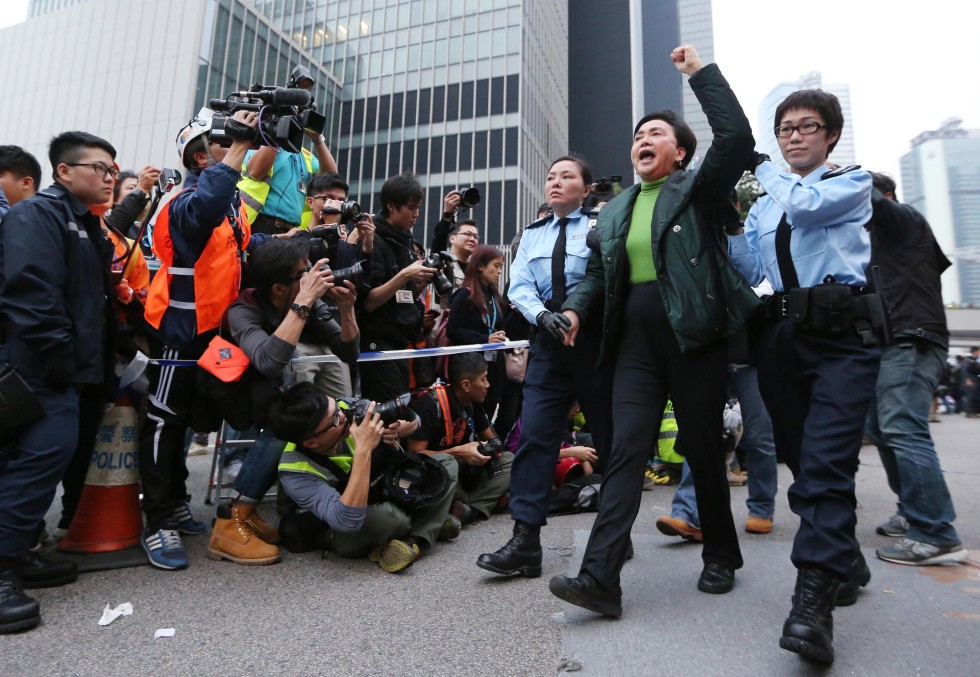
Police take away Emily Lau from Occupy's Admiralty site. Photos: Sam Tsang
Scores of key players and leaders in the Occupy Central campaign, including former heads of the Bar Association and pan-democratic legislators, were arrested as police moved in to clear the Admiralty base camp yesterday.
Among the big names were media tycoon Jimmy Lai Chee-ying of the Hong Kong-listed Next Media group; "father of democracy" Martin Lee Chu-ming; and Civic Party leader Alan Leong Kah-kit and chairwoman Audrey Eu Yuet-mee. Lee, Leong and Eu had all chaired the city's professional body of barristers before.
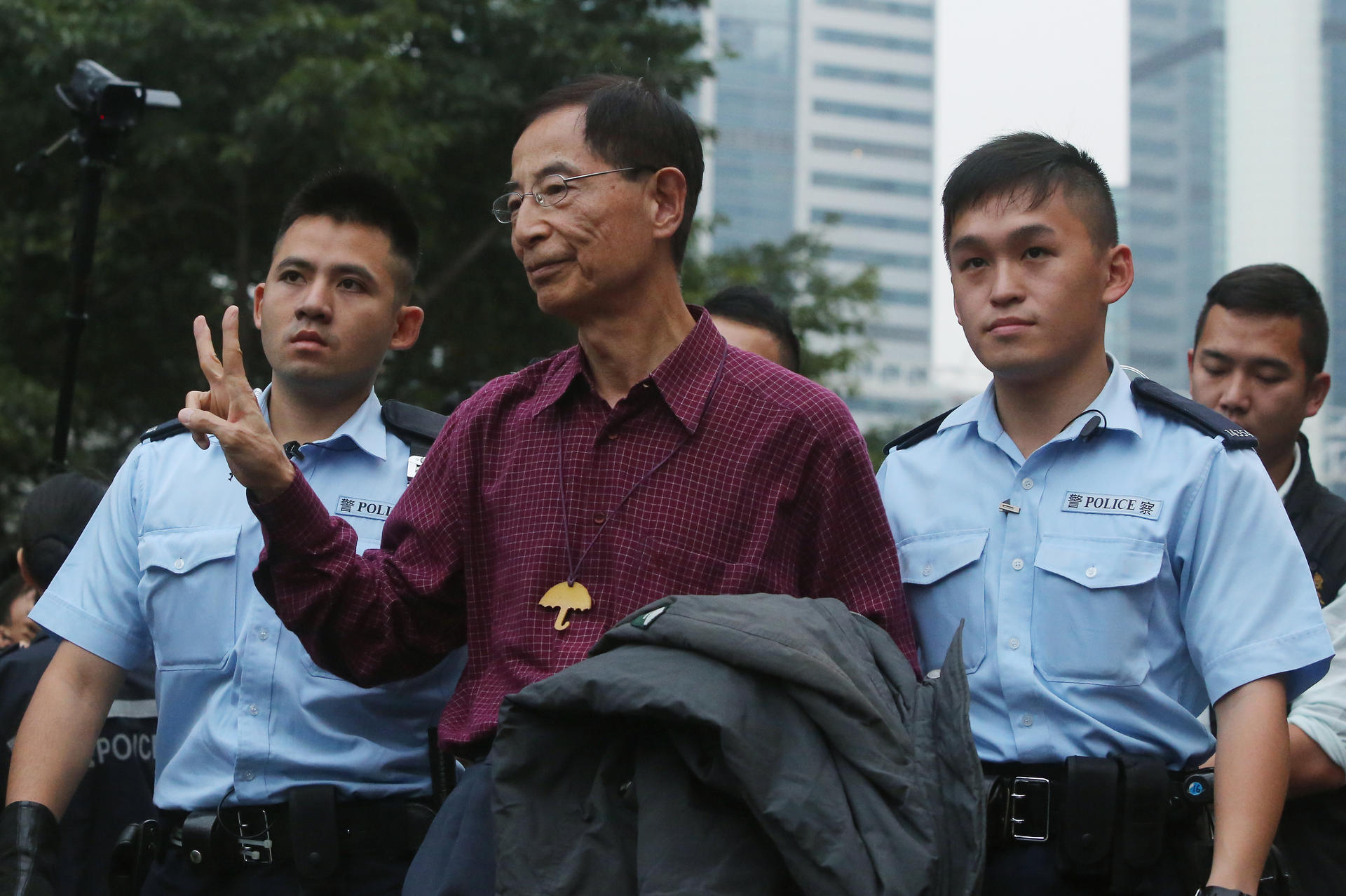
Martin Lee (above) and Jimmy Lai (below) were taken by police from Occupy's Admiralty site. Photos: Sam Tsang
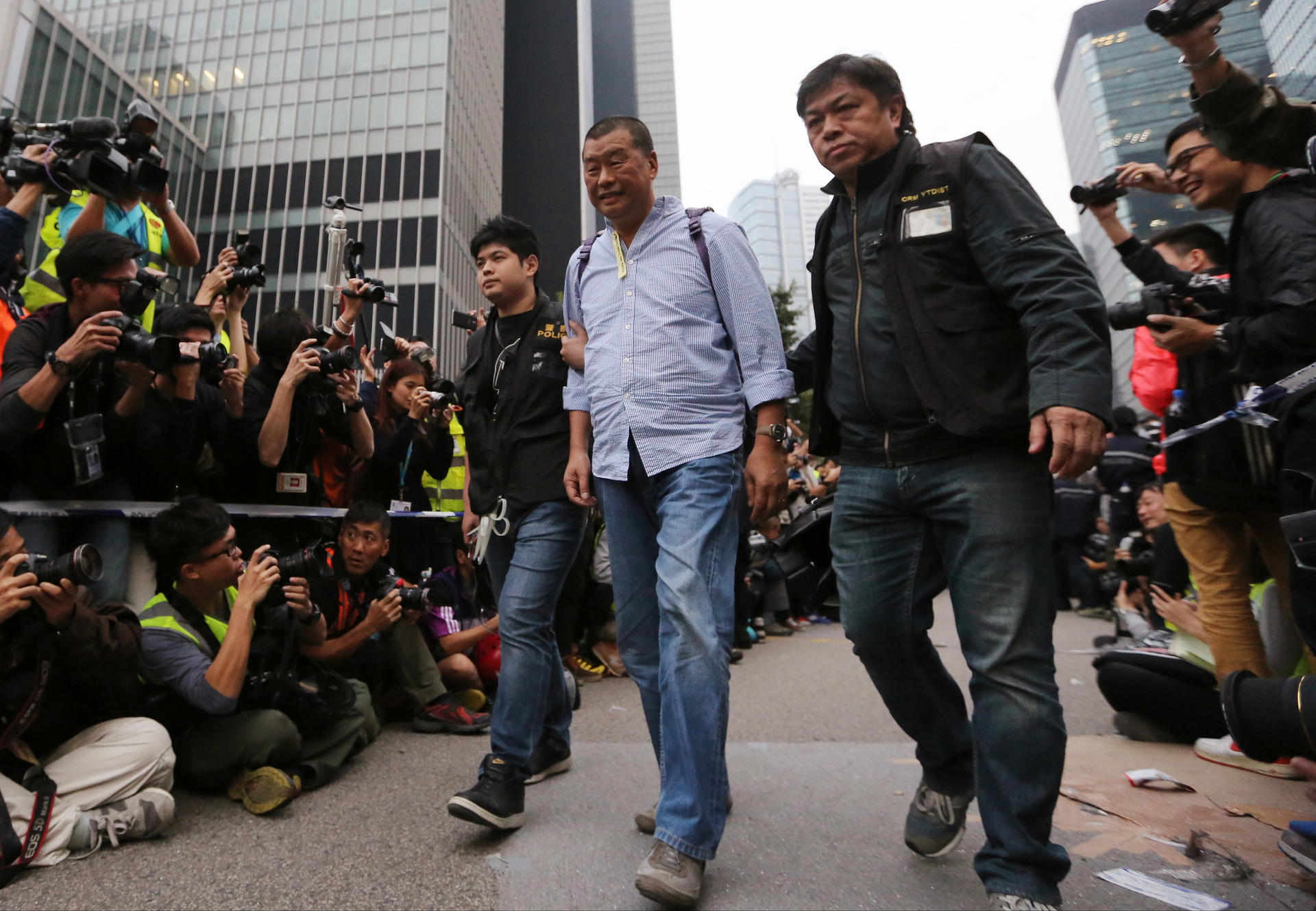
Labour Party chairman and lawmaker Lee Cheuk-yan was one of the last arrests, at 9.10pm. Some 247 people were arrested.
The prominent figures, along with other Occupy protesters, were sitting on Harcourt Road in a last-ditch effort to stand up for genuine universal suffrage before the police action began.
They did not resist when officers approached; Lee and Leong even waved to cheering supporters as they were led away.
Lai, known for his critical stance on Beijing, stepped down as the publisher of Next Media subsidiary Apple Daily, the Chinese-language newspaper reported yesterday. He was replaced by Next Media executive director Ip Yut-kin.
Next Media confirmed Lai was taken away by the police, but stressed "the business and operations of the group are and have been operating by a professional management team and not Mr Lai alone … This incident will not affect the normal and usual course of business of the group."
Also arrested were student activists Alex Chow Yong-kang, Nathan Law Kwun-chung and Eason Chung Yiu-wa of the Federation of Students, which had led the protests since late September.
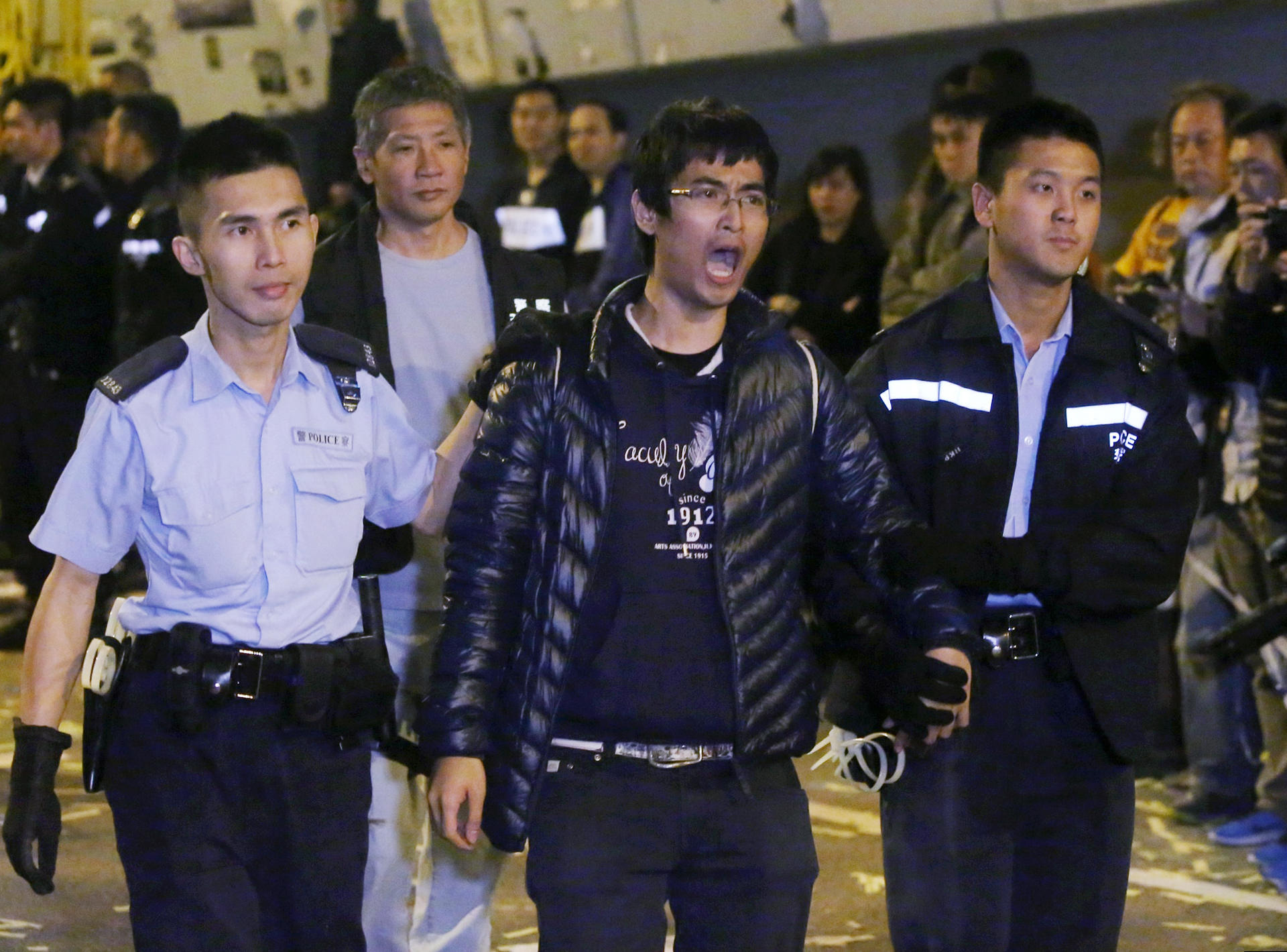
Police take away Alex Chow from Occupy's Admiralty site. Photos: Sam Tsang
At least 20 Democratic Party members - including legislators Emily Lau Wai-hing, Albert Ho Chun-yan, James To Kun-sun and Sin Chung-kai - were arrested as well.
A Beijing resident shouted "Down with the Communist Party!" before he was carried away.
Wang Dengyao, 55, said he had also taken part in the 1989 Tiananmen Square student movement, and had entered the city this week to "find out the real situation in Hong Kong".
All the detainees were told they were being arrested on suspicion of obstructing a police officer in the execution of his duty and for taking part in an unlawful assembly.
Most of them were taken to Kwai Chung police station. By 10.30pm, they remained in police custody.
Hours before the police took action in Admiralty, four activists from radical groups were arrested, apparently to prevent them from showing up at the site.
Wong Yeung-tat, 35, of Civic Passion, was arrested on suspicion of "taking part in, convening and organising an unauthorised assembly". The group said on its Facebook page that he was accused of involvement in 59 cases of illegal assembly.
Cheng Kam-moon, 26, of the Student Front, was arrested on suspicion of attending and inciting others to take part in an illegal assembly.
So Ho, 28, an assistant of People Power lawmaker Raymond Chan Chi-chuen, was arrested on suspicion of taking part in an unlawful assembly.
League of Social Democrats vice-chairman Raphael Wong Ho-ming, 26, was arrested on suspicion of attending and inciting others to take part in an illegal gathering. Except for Wong Yeung-tat, the other three were later released on bail.
- Joined
- Sep 25, 2013
- Messages
- 127
- Points
- 0
Police officer in hospital after collapsing during Occupy clearance
PUBLISHED : Friday, 12 December, 2014, 2:51am
UPDATED : Friday, 12 December, 2014, 2:51am
Amy Nip and Danny Mok
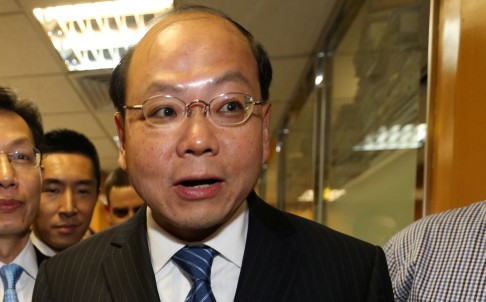
Commissioner of Police Andy Tsang Wai-hung said the sergeant's heart had briefly stopped. Photo: K. Y. Cheng
A police officer is in critical condition in hospital after he collapsed during the clearance operation yesterday.
The sergeant, 49, from the Central division was found unconscious on a police coach, near Fenwick Pier Street in Wan Chai.
A police source said he was involved in operational support, adding that "he started work at 7am … and he's been working every day since mid-October".
He was taken to Ruttonjee Hospital in Wan Chai.
Commissioner of Police Andy Tsang Wai-hung said the sergeant's heart had briefly stopped.
"The sergeant - and the whole force - have been working long hours over the past two and a half months," said Tsang. "We wish him a swift recovery."
Meanwhile, a meeting of the Independent Police Complaints Council yesterday revealed the police received a total of 2,251 complaints over its actions during the Occupy protests.
The council heard that 104 complaints were reportable, including 48 allegations of assault.
Evelyn Lam Man-sai, who handles complaints and police investigations, said many complainants thought police could not use force during an operation, though the law states it is down to each officer's discretion.
- Joined
- Nov 13, 2014
- Messages
- 272
- Points
- 0
Hong Kong police arrest protesters, dismantle main rally site
AFP
December 12, 2014, 4:40 am

Hong Kong (AFP) - Hong Kong police dismantled the city's main pro-democracy protest site Thursday, clearing tents and barricades after more than two months of rallies and arresting more than 200 demonstrators, who vowed their struggle lives on.
Hundreds of police moved in from all sides of the Admiralty camp in the heart of the business district, sweeping away shelters and supply stands before swooping on a core group at the centre of the site, including student leaders and lawmakers.
As police cleared the last handful of protesters late Thursday, parts of the site reopened to traffic for the first time since September.
Those making a last stand were the remnants of what once numbered tens of thousands of people at the height of the protest movement, before public support waned.
The call for free leadership elections has underpinned the demonstrations, and protesters have vowed the clearance operation will not end a campaign they say has redefined the city's vexed relationship with Beijing.
Some were carried by groups of four officers while others were led off on foot, one by one. Those who remained lay on the road shouting, "We are peaceful", "We will not resist" and "I want true democracy".
In all, 209 people were arrested for "unlawful assembly and obstructing police in the execution of their duties", police assistant commissioner Cheung Tak-keung told reporters in a briefing late Thursday.
Protest group Hong Kong Federation of Students (HKFS) said that nine of its members had been arrested.
Media mogul Jimmy Lai, a fierce critic of Beijing, and veteran campaigner Martin Lee were among those led away -- Lee holding up a victory salute to reporters.
Singer Denise Ho shouted "Civil disobedience without fear", as she walked away with officers while lawmaker Claudia Mo sang "We will overcome" and shouted "We will be back" through a megaphone before being escorted off.
Student leaders Alex Chow, Nathan Law and Eason Chung were also take away by police, alongside other protesters including an elderly man in a wheelchair.
"This is not the end of the movement. The political awakening amongst the young is irreversible and we will fight on," Mo told AFP earlier Thursday.
Lee added: "In the heart of every student who has participated in this movement there is now a fire burning, a fire for democracy. This fire cannot be extinguished by an iron fist."
Earlier in the day, police had announced a "lockdown" after a 30-minute window allowing protesters to voluntarily leave the site -- an encampment of tents, supply stations and art installations sprawling along a kilometre of a multi-lane highway through the Admiralty district.
Some managed to leave after the deadline, but were asked to give their identity details to police.
- 'The start of something' -
Thousands gathered on Wednesday night for one final mass rally at the site, but the numbers had already dwindled to hundreds by Thursday morning.
Before the police operation, bailiffs descended with cutters and pliers to take down barricades and load them into trucks to enforce court orders taken out by transport companies frustrated at the long-running disruption.
The Admiralty site has been the focal point of the protest movement since rallies erupted in September, after China's Communist authorities insisted that candidates in Hong Kong's 2017 leadership election will have to be vetted by a loyalist committee.
Protesters say this will ensure the election of a pro-Beijing stooge, and their struggle has highlighted a litany of frustrations in the former British colony including a yawning income gap and lack of affordable housing.
Some in Admiralty expressed a sense of failure Thursday, after the authorities in Hong Kong and Beijing refused to give any concessions on political reform, but said the occupation had changed Hong Kong for good.
"I feel sad because we haven't achieved our mission, but I think there can be progress in the future," said 23-year-old welfare worker Dubi. "I think it's the start of something long-term."
Others were still determined to stand their ground.
"I'm not tired (of the campaign). I'll never be tired, only the government is tired," said 19-year-old student Alice.
There had been fears that radical splinter groups would dig in for a final stand, following violent clashes outside government headquarters in Admiralty at the end of last month.
But many said they did not want a confrontation and there were no clashes as police swept through.
Police said it would clear the last remaining protest site in Hong Kong's Causeway Bay at an "appropriate time".
"We hope to handle this as soon as possible," police assistant commissioner Cheung said, without offering details.
Similar threads
- Replies
- 17
- Views
- 735
- Replies
- 1
- Views
- 109
- Replies
- 14
- Views
- 987
- Replies
- 46
- Views
- 3K

